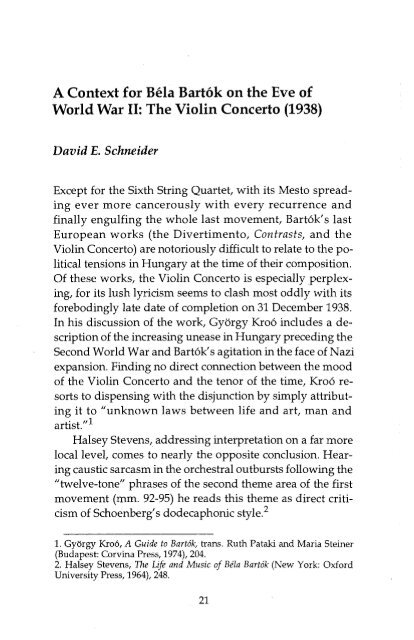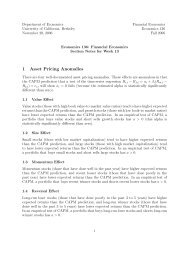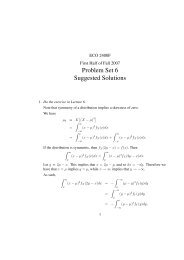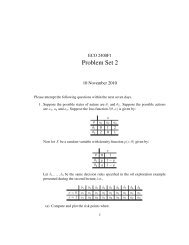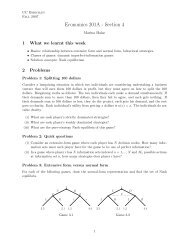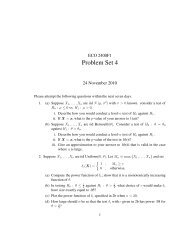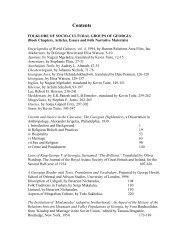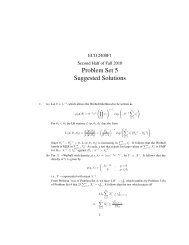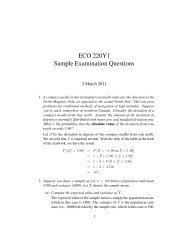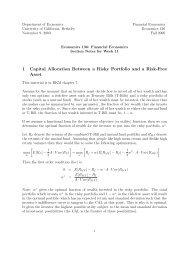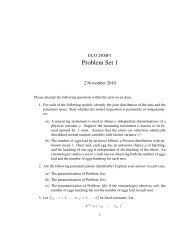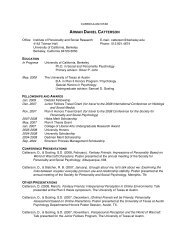A Context for Bela Bartok on the Eve of World War II: The Violin ...
A Context for Bela Bartok on the Eve of World War II: The Violin ...
A Context for Bela Bartok on the Eve of World War II: The Violin ...
You also want an ePaper? Increase the reach of your titles
YUMPU automatically turns print PDFs into web optimized ePapers that Google loves.
A <str<strong>on</strong>g>C<strong>on</strong>text</str<strong>on</strong>g> <str<strong>on</strong>g>for</str<strong>on</strong>g> <str<strong>on</strong>g>Bela</str<strong>on</strong>g> <str<strong>on</strong>g>Bartok</str<strong>on</strong>g> <strong>on</strong> <strong>the</strong> <strong>Eve</strong> <strong>of</strong><br />
<strong>World</strong> <strong>War</strong> <strong>II</strong>: <strong>The</strong> <strong>Violin</strong> C<strong>on</strong>certo (1938)<br />
David E. Schneider<br />
Except <str<strong>on</strong>g>for</str<strong>on</strong>g> <strong>the</strong> Sixth String Quartet, with its Mesto spreading<br />
ever more cancerously with every recurrence and<br />
finally engulfing <strong>the</strong> whole last movement, <str<strong>on</strong>g>Bartok</str<strong>on</strong>g>'s last<br />
European works (<strong>the</strong> Divertimento, C<strong>on</strong>trasts, and <strong>the</strong><br />
<strong>Violin</strong> C<strong>on</strong>certo) are notoriously difficult to relate to <strong>the</strong> political<br />
tensi<strong>on</strong>s in Hungary at <strong>the</strong> time <strong>of</strong> <strong>the</strong>ir compositi<strong>on</strong>.<br />
Of <strong>the</strong>se works, <strong>the</strong> <strong>Violin</strong> C<strong>on</strong>certo is especially perplexing,<br />
<str<strong>on</strong>g>for</str<strong>on</strong>g> its lush lyricism seems to clash most oddly with its<br />
<str<strong>on</strong>g>for</str<strong>on</strong>g>ebodingly late date <strong>of</strong> completi<strong>on</strong> <strong>on</strong> 31 December 1938.<br />
In his discussi<strong>on</strong> <strong>of</strong> <strong>the</strong> work, Gyorgy Kroo includes a descripti<strong>on</strong><br />
<strong>of</strong> <strong>the</strong> increasing unease in Hungary preceding <strong>the</strong><br />
Sec<strong>on</strong>d <strong>World</strong> <strong>War</strong> and <str<strong>on</strong>g>Bartok</str<strong>on</strong>g>'s agitati<strong>on</strong> in <strong>the</strong> face <strong>of</strong> Nazi<br />
expansi<strong>on</strong>. Finding no direct c<strong>on</strong>necti<strong>on</strong> between <strong>the</strong> mood<br />
<strong>of</strong> <strong>the</strong> <strong>Violin</strong> C<strong>on</strong>certo and <strong>the</strong> tenor <strong>of</strong> <strong>the</strong> time, Kroo resorts<br />
to dispensing with <strong>the</strong> disjuncti<strong>on</strong> by simply attributing<br />
it to "unknown laws between life and art, man and<br />
artist. <strong>II</strong> 1<br />
Halsey Stevens, addressing interpretati<strong>on</strong> <strong>on</strong> a far more<br />
local level, comes to nearly <strong>the</strong> opposite c<strong>on</strong>clusi<strong>on</strong>. Hearing<br />
caustic sarcasm in <strong>the</strong> orchestral outbursts following <strong>the</strong><br />
/I twelve-t<strong>on</strong>e" phrases <strong>of</strong> <strong>the</strong> sec<strong>on</strong>d <strong>the</strong>me area <strong>of</strong> <strong>the</strong> first<br />
movement (mm. 92-95) he reads this <strong>the</strong>me as direct criticism<br />
<strong>of</strong> Schoenberg's dodecaph<strong>on</strong>ic style.2<br />
1. Gyorgy Kro6, A Guide to <str<strong>on</strong>g>Bartok</str<strong>on</strong>g>, trans. Ruth Pataki and Maria Steiner<br />
(Budapest: Corvina Press, 1974),204.<br />
2. Halsey Stevens, <strong>The</strong> Life and Music <strong>of</strong> <str<strong>on</strong>g>Bela</str<strong>on</strong>g> <str<strong>on</strong>g>Bartok</str<strong>on</strong>g> (New York: Ox<str<strong>on</strong>g>for</str<strong>on</strong>g>d<br />
University Press, 1964), 248.<br />
21
22 Schneider <str<strong>on</strong>g>Bartok</str<strong>on</strong>g>'s <strong>Violin</strong> C<strong>on</strong>certo<br />
Like most opposites, Kroo's and Stevens's interpretati<strong>on</strong>s<br />
share a comm<strong>on</strong> assumpti<strong>on</strong>: <str<strong>on</strong>g>for</str<strong>on</strong>g> <strong>the</strong>re to be a c<strong>on</strong>necti<strong>on</strong><br />
between a compositi<strong>on</strong> and a given c<strong>on</strong>text, <strong>the</strong> work<br />
must address that c<strong>on</strong>text specifically and directly. Kroo,<br />
taking <strong>the</strong> significant c<strong>on</strong>text to be Nazi Germany's increasing<br />
influence and focusing <strong>on</strong> what he takes to be <strong>the</strong> spirit<br />
<strong>of</strong> <strong>the</strong> work as a whole, perceives no such c<strong>on</strong>necti<strong>on</strong>;<br />
Stevens, taking advanced compositi<strong>on</strong>al techniques <strong>of</strong> <strong>the</strong><br />
1930s as <strong>the</strong> significant c<strong>on</strong>text and focusing <strong>on</strong> a few startling<br />
moments, finds <strong>on</strong>e. Nei<strong>the</strong>r positi<strong>on</strong> can be disproved;<br />
nei<strong>the</strong>r is c<strong>on</strong>vincing. Although Hungary in <strong>the</strong> late<br />
1930s was undeniably a place <strong>of</strong> extreme tensi<strong>on</strong> and <str<strong>on</strong>g>Bartok</str<strong>on</strong>g><br />
was well aware <strong>of</strong> Schoenberg's compositi<strong>on</strong>al practices,<br />
nei<strong>the</strong>r critic allows <str<strong>on</strong>g>for</str<strong>on</strong>g> a multivalent, flexible, or indirect<br />
manifestati<strong>on</strong> <strong>of</strong> his chosen c<strong>on</strong>text in <str<strong>on</strong>g>Bartok</str<strong>on</strong>g>'s work. Fur<strong>the</strong>rmore,<br />
though <str<strong>on</strong>g>Bartok</str<strong>on</strong>g>'s letters from this time reveal him<br />
to be highly disturbed by <strong>the</strong> rise <strong>of</strong> Nati<strong>on</strong>al Socialism, we<br />
must not <str<strong>on</strong>g>for</str<strong>on</strong>g>get that <strong>the</strong>se documents were private, written<br />
to c<strong>on</strong>fidantes, whereas <strong>the</strong> <strong>Violin</strong> C<strong>on</strong>certo is a large-scale,<br />
commissi<strong>on</strong>ed work in <strong>on</strong>e <strong>of</strong> <strong>the</strong> most public genres. To<br />
argue persuasively <str<strong>on</strong>g>for</str<strong>on</strong>g> a c<strong>on</strong>necti<strong>on</strong> between aspects <strong>of</strong> <strong>the</strong><br />
musical style <strong>of</strong> <strong>the</strong> <strong>Violin</strong> C<strong>on</strong>certo and <strong>the</strong> relevant political<br />
and musical c<strong>on</strong>texts <strong>of</strong> its time without trivializing ei<strong>the</strong>r<br />
work or c<strong>on</strong>text requires a delicate balancing <strong>of</strong> general<br />
mood and specific circumstance, public and private. Most<br />
<strong>of</strong> all it demands a good hard look at <str<strong>on</strong>g>Bartok</str<strong>on</strong>g>'s positi<strong>on</strong> in<br />
Hungary in <strong>the</strong> years 1937 and 1938 and a sufficiently historicized<br />
noti<strong>on</strong> <strong>of</strong> what might c<strong>on</strong>stitute his artistic resp<strong>on</strong>se<br />
to it.<br />
To put events surrounding <strong>the</strong> compositi<strong>on</strong> <strong>of</strong> <strong>the</strong> <strong>Violin</strong><br />
C<strong>on</strong>certo in perspective, our account begins after <strong>the</strong><br />
work's completi<strong>on</strong> at a time <strong>of</strong> political tensi<strong>on</strong> in Hungary<br />
that <str<strong>on</strong>g>Bartok</str<strong>on</strong>g> anticipated, but never pers<strong>on</strong>ally experienced.<br />
We <strong>the</strong>n turn back to <strong>the</strong> early 1930s to work toward an un-
24 Schneider Bart6k's <strong>Violin</strong> C<strong>on</strong>certo<br />
Bart6k's political sympathies were far more liberal than<br />
Teleki's; his departure <str<strong>on</strong>g>for</str<strong>on</strong>g> <strong>the</strong> United States <strong>on</strong> 12 October<br />
1940 was a more timely and infinitely less violent exit than<br />
<strong>the</strong> prime minister's suicide several m<strong>on</strong>ths later. Yet, that<br />
even a man <strong>of</strong> Teleki's quasi-fascist c<strong>on</strong>victi<strong>on</strong>s would share<br />
Bart6k's sense that abdicati<strong>on</strong> was <strong>the</strong> <strong>on</strong>ly moral resp<strong>on</strong>se<br />
to Hungary's increasing attracti<strong>on</strong> to <strong>the</strong> magnet <strong>of</strong> radical<br />
Nati<strong>on</strong>al Socialism illustrates <strong>the</strong> tensi<strong>on</strong> <strong>of</strong> <strong>the</strong> political atmosphere.<br />
It was becoming increasingly clear that <strong>the</strong>re<br />
was near zero tolerance <strong>of</strong> neutrality.<br />
Teleki's and Bart6k's respective departures were tacit<br />
admissi<strong>on</strong>s that <strong>the</strong> gap between <strong>the</strong> various positi<strong>on</strong>s <strong>the</strong>y<br />
embodied and <strong>the</strong> current political reality was, at least <str<strong>on</strong>g>for</str<strong>on</strong>g><br />
<strong>the</strong> <str<strong>on</strong>g>for</str<strong>on</strong>g>eseeable future, unbridgeable. However, to acknowledge<br />
that Bart6k's decisi<strong>on</strong> to leave Hungary represented a<br />
cul-de-sac <strong>on</strong> <strong>the</strong> road <strong>of</strong> negotiati<strong>on</strong> is to imply that Bart6k<br />
had been negotiating until that time. In o<strong>the</strong>r words, until<br />
Bart6k left Hungary <str<strong>on</strong>g>for</str<strong>on</strong>g> good, he must have been finding a<br />
way to negotiate between his ideals and <strong>of</strong>ficial policies.<br />
For, as Hitler's radical brand <strong>of</strong> fascism swept Germany and<br />
began to hold sway in Hungary, compromise was not opti<strong>on</strong>al,<br />
it was a fact <strong>of</strong> life, a matter <strong>of</strong> survival; it need not<br />
imply moral or artistic prostituti<strong>on</strong>.S Lucky were those<br />
who, like Bart6k, found a way to produce valuable art<br />
through <strong>the</strong> end <strong>of</strong> <strong>the</strong> decade. Luckier still was <strong>the</strong> fact that<br />
Bart6k was well enough c<strong>on</strong>nected outside <strong>of</strong> Hungary to<br />
be able to leave when <strong>the</strong> time came, and, unlike Prime<br />
5. Rene Leibowitz's infamous attack <strong>on</strong> Bart6k as a compromiser <strong>of</strong><br />
Schoenbergian ideals <strong>of</strong> modern music ["<str<strong>on</strong>g>Bela</str<strong>on</strong>g> Bart6k ou la possibilite de<br />
compromis dans la musique c<strong>on</strong>temporaine," Les temps madernes 25<br />
(October 1947): 706-34] has obvious political overt<strong>on</strong>es despite its ostensibly<br />
"purely artistic" charge. I would like to thank Danielle Fosler<br />
Lussier <str<strong>on</strong>g>for</str<strong>on</strong>g> pointing out <strong>the</strong> political implicati<strong>on</strong>s <strong>of</strong> Leibowitz's article.<br />
<strong>The</strong> subject will be treated in depth in her <str<strong>on</strong>g>for</str<strong>on</strong>g>thcoming dissertati<strong>on</strong> <strong>on</strong> <strong>the</strong><br />
postwar recepti<strong>on</strong> <strong>of</strong> Bart6k's music.
26 Schneider <str<strong>on</strong>g>Bartok</str<strong>on</strong>g>'s <strong>Violin</strong> C<strong>on</strong>certo<br />
Hans Rosbaud and I played <strong>the</strong> piano solo. (This was my last appearance<br />
in Germany.) 9<br />
<strong>The</strong> paren<strong>the</strong>sis accentuates like a stage whisper-calling<br />
attenti<strong>on</strong> to <strong>the</strong> phrase while acknowledging its peripheral<br />
relati<strong>on</strong>ship to <strong>the</strong> subject <strong>of</strong> <strong>the</strong> program note proper. But,<br />
while by 1939 Bart6k's absence from <strong>the</strong> roll call <strong>of</strong> artists<br />
per<str<strong>on</strong>g>for</str<strong>on</strong>g>ming in Germany was a source <strong>of</strong> pride, <str<strong>on</strong>g>for</str<strong>on</strong>g> several<br />
years between 1933 and 1938 it had been a source <strong>of</strong> recurrent<br />
frustrati<strong>on</strong>. Indeed, <str<strong>on</strong>g>Bartok</str<strong>on</strong>g> may have publicized his<br />
avoidance <strong>of</strong> Germany in a program note to <strong>the</strong> Sec<strong>on</strong>d<br />
Piano C<strong>on</strong>certo not <strong>on</strong>ly because this was <strong>the</strong> last work he<br />
played in that country, but because it was <strong>the</strong> <strong>on</strong>e he had<br />
most wanted to play <strong>the</strong>re again.<br />
Between April 1935 and July 1938 Bart6k was invited to<br />
play in Germany no less than ten times. Eight <strong>of</strong> <strong>the</strong>se invitati<strong>on</strong>s<br />
involved a perpetually postp<strong>on</strong>ed tour, which,<br />
am<strong>on</strong>g a <strong>of</strong> o<strong>the</strong>r appearances, was always to have<br />
included per<str<strong>on</strong>g>for</str<strong>on</strong>g>mances <strong>of</strong> <strong>the</strong> Sec<strong>on</strong>d Piano C<strong>on</strong>certo with<br />
<strong>the</strong> Berlin Philharm<strong>on</strong>ic (Breuer, 9). That Bart6k was initially<br />
nei<strong>the</strong>r a passive recipient <strong>of</strong> German overtures nor<br />
ignorant <strong>of</strong> <strong>the</strong> intrusi<strong>on</strong> <strong>of</strong> new German politics into artistic<br />
affairs is suggested by a 4 February 1935 draft <strong>of</strong> <strong>the</strong> letter<br />
Bart6k wrote to <strong>of</strong>ficials <strong>of</strong> <strong>the</strong> Reichsmusikkammer. In<br />
resp<strong>on</strong>se to <strong>the</strong>ir inquiry about his availability and repertoire<br />
<str<strong>on</strong>g>for</str<strong>on</strong>g> playing with <strong>the</strong> Berlin Philharm<strong>on</strong>ic in spring<br />
1935, <strong>the</strong> draft shows that Bart6k had originally recommended<br />
his Sec<strong>on</strong>d Piano C<strong>on</strong>certo because he had" already<br />
played <strong>the</strong> Rhapsody op. 1 under Bruno Walter and<br />
<strong>the</strong> First Piano C<strong>on</strong>certo under Erich Kleiber in Berlin." lO<br />
Significantly, Bart6k was savvy enough later to cross out <strong>the</strong><br />
9. Translati<strong>on</strong> taken from <str<strong>on</strong>g>Bela</str<strong>on</strong>g> Bart6k Essays, ed. Benjamin Such<strong>of</strong>f (New<br />
York: St. Martin's Press, 1976), 423.<br />
10. Budapest <str<strong>on</strong>g>Bartok</str<strong>on</strong>g> Archives #BH <strong>II</strong>j67.
28 Schneider Bart6k's <strong>Violin</strong> C<strong>on</strong>certo<br />
A member <strong>of</strong> Universal Editi<strong>on</strong>'s Vienna <strong>of</strong>fice c<strong>on</strong>tinued in<br />
more c<strong>on</strong>ciliatory, but no less chilling terms:<br />
We know your positi<strong>on</strong> in <strong>the</strong>se matters and it is far from our intenti<strong>on</strong><br />
to ask you <strong>on</strong> purely business grounds to take a positi<strong>on</strong> that<br />
you might absolutely not accept. <strong>The</strong> new German terminology is<br />
not c<strong>on</strong>cerned with whe<strong>the</strong>r <strong>on</strong>e is Aryan (which is not at all to be<br />
found in Hungary), but above all, whe<strong>the</strong>r or not he is <strong>of</strong> Jewish origin.<br />
Several <strong>of</strong> our composers were inclined, in order to facilitate fur<strong>the</strong>r<br />
per<str<strong>on</strong>g>for</str<strong>on</strong>g>mances in Germany, to provide this type <strong>of</strong> pro<strong>of</strong> in which<br />
<strong>the</strong>y supplied copies <strong>of</strong> <strong>the</strong>ir baptismal certificates and <strong>the</strong> marriage<br />
certificates <strong>of</strong> <strong>the</strong>ir parents and grandparents. We give <strong>the</strong>se facts to<br />
you without any commentary and c<strong>on</strong>sider ourselves to be obliged<br />
<strong>on</strong>ly to notify you and we must leave it to your own judgement<br />
whe<strong>the</strong>r or not you will provide us with <strong>the</strong> necessary papers <str<strong>on</strong>g>for</str<strong>on</strong>g> <str<strong>on</strong>g>for</str<strong>on</strong>g>warding<br />
to Berlin.12<br />
As <strong>the</strong> t<strong>on</strong>e <strong>of</strong> <strong>the</strong> letter from Universal's Vienna <strong>of</strong>fice anticipates,<br />
<str<strong>on</strong>g>Bartok</str<strong>on</strong>g> had no intenti<strong>on</strong> <strong>of</strong> complying with <strong>the</strong>ir<br />
request. In his words: "I would not dream <strong>of</strong> sending certificates<br />
<strong>of</strong> baptism to Germany even if I had <strong>the</strong>m at hand." 13<br />
<str<strong>on</strong>g>Bartok</str<strong>on</strong>g>'s refusal to cooperate with his publisher in <strong>the</strong> face<br />
<strong>of</strong> German pressure, a stance he would take again in 1938,<br />
shows that when <str<strong>on</strong>g>Bartok</str<strong>on</strong>g> clearly saw himself being asked to<br />
make a moral compromise, he was indeed willing to take a<br />
stand.14<br />
In many <strong>of</strong> <str<strong>on</strong>g>Bartok</str<strong>on</strong>g>'s dealings with German organizati<strong>on</strong>s<br />
in <strong>the</strong> some half-dozen years be<str<strong>on</strong>g>for</str<strong>on</strong>g>e <strong>the</strong> Anschluss,<br />
however, <strong>the</strong> choices between moral rights and wr<strong>on</strong>gs<br />
were not so clearly articulated. As a n<strong>on</strong>-Jewish citizen <strong>of</strong> a<br />
country <strong>of</strong>ficially friendly to Germany, <str<strong>on</strong>g>Bartok</str<strong>on</strong>g>'s lack <strong>of</strong><br />
11. Documenta Bart6kiana 3, ed. Denijs Dille (Budapest: Akademiai Kiado,<br />
1968),170. Original in German, all translati<strong>on</strong>s are my own unless o<strong>the</strong>rwise<br />
specified.<br />
12. Ibid.<br />
13. Quoted in Kroo, A Guide to Bart6k, 174.<br />
14. For documentati<strong>on</strong> <strong>of</strong> Bart6k's 1938 refusat see his letter to Mrs.<br />
Muller-Widmann, 13 April 1938, in <str<strong>on</strong>g>Bela</str<strong>on</strong>g> Bart6k Letters, ed. Janos Demeny,<br />
trans. Peter Balaban and Istvan Farkas (L<strong>on</strong>d<strong>on</strong>: Faber and Faber, 1971),<br />
267.
epercussi<strong>on</strong>s Spring-Fall 1996<br />
cooperati<strong>on</strong> in <strong>the</strong> documentati<strong>on</strong> <strong>of</strong> his racial background<br />
was apparently overlooked in favor <strong>of</strong> his nati<strong>on</strong>ality. Thus,<br />
Bart6k could at <strong>on</strong>ce occupy a moral high ground vis-a-vis<br />
Germany while he c<strong>on</strong>tinued to be approached about per<str<strong>on</strong>g>for</str<strong>on</strong>g>ming<br />
and his works c<strong>on</strong>tinued to be played <strong>the</strong>re.<br />
Ambiguity as to Bart6k's proper status in Germany appears<br />
to be <strong>the</strong> most likely explanati<strong>on</strong> <str<strong>on</strong>g>for</str<strong>on</strong>g> <strong>the</strong> c<strong>on</strong>stant <strong>on</strong>again/<br />
<strong>of</strong>f-again that resulted in <strong>the</strong> ultimate cancellati<strong>on</strong> or<br />
indefinite postp<strong>on</strong>ement <strong>of</strong> all ten <strong>of</strong> his invitati<strong>on</strong>s to<br />
Germanybeginning in 1935. In light <strong>of</strong> <strong>the</strong> evidence we<br />
have dem<strong>on</strong>strating that Bart6k was willing to accept all <strong>the</strong><br />
invitati<strong>on</strong>s except <strong>the</strong> last, which arrived after <strong>the</strong><br />
Anschluss (Breuer, 11), <strong>the</strong>re seems to have been an ambivalence<br />
toward him <strong>on</strong> <strong>the</strong> part <strong>of</strong> some German administrators.<br />
This would explain Bart6k's report <strong>on</strong> 3 February 1937<br />
that:<br />
I was to travel to Berlin in ApriL ... But now-after two years <strong>of</strong> negotiati<strong>on</strong>s<br />
and lots <strong>of</strong> delays-those Nazis have again postp<strong>on</strong>ed <strong>the</strong><br />
c<strong>on</strong>cert, [this time] to <strong>the</strong> beginning <strong>of</strong> June (if not ad graecas calendas):<br />
<strong>the</strong>re must be a lot <strong>of</strong> c<strong>on</strong>fusi<strong>on</strong> <strong>the</strong>re, <strong>the</strong>y <strong>the</strong>mselves d<strong>on</strong>'t<br />
even know what <strong>the</strong>y want.IS<br />
But if "those Nazi" c<strong>on</strong>cert organizers in Berlin were sending<br />
mixed signals to Bart6k, Bart6k was also making himself<br />
hard to pin down by defending his moral high ground<br />
with strict attenti<strong>on</strong> to financial detail. While he had taken<br />
care not to include <strong>of</strong>fending names in his letter to <strong>the</strong><br />
Reichsmusikkammer in 1935, in <strong>the</strong> same letter Bart6k had<br />
potentially complicated matters by asking <str<strong>on</strong>g>for</str<strong>on</strong>g> payment in<br />
Swiss francs.<br />
15. Letter to Sandor Albrecht, 3 February 1937, in Bart6k <str<strong>on</strong>g>Bela</str<strong>on</strong>g> levelei (<str<strong>on</strong>g>Bela</str<strong>on</strong>g><br />
Bart6k's letters), ed. Janos Demeny (Budapest: Zenemukiad61976), 545-<br />
46.<br />
29
epercussi<strong>on</strong>s Spring-Fall 1996<br />
In fact, Bart6k had been scheduled to give a recital <str<strong>on</strong>g>for</str<strong>on</strong>g> <strong>the</strong><br />
Radio in Berlin in April 1937, and <strong>the</strong> cancellati<strong>on</strong> <strong>of</strong> this engagement<br />
may have accounted <str<strong>on</strong>g>for</str<strong>on</strong>g> a porti<strong>on</strong> <strong>of</strong> Bart6k's lack<br />
<strong>of</strong> generosity toward <strong>the</strong> German Radio.18 Similarly, Bart6k<br />
was furious over Germany's decisi<strong>on</strong> to stop paying rental<br />
fees <str<strong>on</strong>g>for</str<strong>on</strong>g> orchestral parts obtained from Universal Editi<strong>on</strong>, a<br />
fact Bart6k became aware <strong>of</strong> when he received a semiannual<br />
financial statement early in 1937 (Breuer, 11).<br />
Despite Bart6k's growing hostility to German policies,<br />
he repeatedly tried to avoid having his opini<strong>on</strong>s publicized.<br />
This is shown again in late March 1938 when, in <strong>the</strong> heated<br />
political atmosphere directly following <strong>the</strong> Anschluss, two<br />
Hungarian papers re-opened <strong>the</strong> affair <strong>of</strong> his Radio ban<br />
from <strong>the</strong> preceding fall. Now, in resp<strong>on</strong>se to an article reporting<br />
<strong>the</strong> ban published in <strong>the</strong> January 1938 issue <strong>of</strong> Die<br />
Musik,19 <strong>the</strong> Hungarian papers ran to Bart6k's "defense" by<br />
reiterating <strong>the</strong> 1/ apolitical" motivati<strong>on</strong> <str<strong>on</strong>g>for</str<strong>on</strong>g> Bart6k's acti<strong>on</strong>. 20<br />
Dismayed that <strong>the</strong> affair was attracting publicity <strong>on</strong>ce<br />
again, Bart6k resp<strong>on</strong>ded with ano<strong>the</strong>r carefully worded letter<br />
to <strong>the</strong> editor:<br />
[It has] come to my attenti<strong>on</strong> that in <strong>on</strong>e <strong>of</strong> your issues <strong>of</strong> last week<br />
<strong>the</strong>y returned to an affair <strong>of</strong> mine that we could rightly c<strong>on</strong>sider<br />
closed with my published resp<strong>on</strong>se in <strong>the</strong> November Pesti Napl6<br />
[Pest Journal]. Now <strong>the</strong>y have again published my statement with<br />
<strong>the</strong> mistaken additi<strong>on</strong> that I made it <str<strong>on</strong>g>for</str<strong>on</strong>g> or sent it to <strong>the</strong> German <strong>of</strong>ficials.<br />
I would be very obliged to you <str<strong>on</strong>g>for</str<strong>on</strong>g> your publicati<strong>on</strong> <strong>of</strong> <strong>the</strong> fact<br />
that to this date, that is until <strong>the</strong> twenty-seventh <strong>of</strong> March 1938, I<br />
18. Two letters from <str<strong>on</strong>g>Bartok</str<strong>on</strong>g>'s manager Andre Schulh<strong>of</strong> menti<strong>on</strong> <strong>the</strong> possibility<br />
<strong>of</strong> Bart6k playing <strong>on</strong> German Radio: 16 July 1936 (Budapest Bart6k<br />
Archives #BH 1374) and 7 December 1936 (#BH 1378).<br />
19. "Rundfunk," Die Musik 30, no. 4 Ganuary 1938): 287.<br />
20. See "Mi igaz abb6!, hogy <str<strong>on</strong>g>Bartok</str<strong>on</strong>g> nem engedelyezte muveinek kozvetiteset<br />
az olasz es nemet radi6k szamara?" (What is true about Bart6k<br />
not allowing-his Works to De broadcast <strong>on</strong> Italian and German Radio?),<br />
A Zene, 16 March 1938, 187; reprinted in Demeny, "<str<strong>on</strong>g>Bartok</str<strong>on</strong>g> <str<strong>on</strong>g>Bela</str<strong>on</strong>g> palyaja<br />
deleI6jen," 662-63; and "Bart6k <str<strong>on</strong>g>Bela</str<strong>on</strong>g> megmagyarazza radio tilalmat" (<str<strong>on</strong>g>Bela</str<strong>on</strong>g><br />
Bart6k explains his radio boycott),Az Est, 22 March 1938; reprinted ibid.,<br />
663.<br />
31
32 Schneider Bart6k's <strong>Violin</strong> C<strong>on</strong>certo<br />
have never made any kind <strong>of</strong> statement <str<strong>on</strong>g>for</str<strong>on</strong>g> <strong>the</strong> German <strong>of</strong>ficials, I<br />
did not send <strong>the</strong>m anything <strong>of</strong> <strong>the</strong> kind .... Whose interest can it be in<br />
to c<strong>on</strong>tinually stir up this matter? 21<br />
As Bart6k seems to have been aware, any report <strong>of</strong> an acti<strong>on</strong><br />
as politically charged as his negotiati<strong>on</strong>s with <strong>the</strong> Hungarian<br />
Radio was potentially dangerous. In a climate in which<br />
"anglophile" was <strong>the</strong> term used to describe "neutrality," accounts<br />
<strong>of</strong> Bart6k's acti<strong>on</strong>s as "apolitical" were likely and<br />
perhaps even intended to be read as <strong>the</strong> exact opposite <strong>of</strong><br />
<strong>the</strong>ir surface meaning.<br />
Bart6k's two communicati<strong>on</strong>s to <strong>the</strong> Hungarian papers<br />
regarding <strong>the</strong> Radio ban are finely-tuned pieces <strong>of</strong> writing<br />
designed to defuse as much as possible <strong>the</strong> political c<strong>on</strong>tent<br />
<strong>of</strong> his stance. While his reluctance to have his views publicized<br />
was in part due to <strong>the</strong> potential dangers <strong>of</strong> <strong>of</strong>fending<br />
<strong>the</strong> Germans and <strong>the</strong> pro-German sympathizers in<br />
Hungary, Bart6k could also have wanted to avoid too close<br />
an associati<strong>on</strong> with various anti-German facti<strong>on</strong>s in<br />
Hungary. Articles focusing <strong>on</strong> his oppositi<strong>on</strong> to Germany<br />
were likely to be at least as disturbing to Bart6k <str<strong>on</strong>g>for</str<strong>on</strong>g> <strong>the</strong>ir domestic<br />
implicati<strong>on</strong>s as <strong>the</strong>y were <str<strong>on</strong>g>for</str<strong>on</strong>g> <strong>the</strong>ir potential to destroy<br />
what little relati<strong>on</strong>ship he had with instituti<strong>on</strong>s in <strong>the</strong><br />
Third Reich. In Hungary, oppositi<strong>on</strong> to Germany was a<br />
characteristic comm<strong>on</strong> to many facti<strong>on</strong>s, from <strong>the</strong> extreme<br />
right, <strong>the</strong> fascist Turanians-who saw <strong>the</strong> Magyars (not <strong>the</strong><br />
Germans) as <strong>the</strong> true master race-to <strong>the</strong> far left, <strong>the</strong> communists.<br />
Publicity that painted him as an outspoken opp<strong>on</strong>ent<br />
<strong>of</strong> Germany thrust Bart6k into a positi<strong>on</strong> <strong>of</strong><br />
prominence that had <strong>the</strong> potential to allow his stance to be<br />
co-opted by any number <strong>of</strong> political camps. As we will see<br />
in a later secti<strong>on</strong>, this did in fact occur <strong>on</strong> at least <strong>on</strong>e<br />
21. Az Est, 27 March 1938; reprinted in Demeny, "Bart6k <str<strong>on</strong>g>Bela</str<strong>on</strong>g> paIyaja<br />
deleI6jen," 663. In <strong>the</strong> first sentence <strong>of</strong> <strong>the</strong> quotati<strong>on</strong> Bart6k remembers incorrectly.<br />
He wrote <strong>the</strong> letter in questi<strong>on</strong> to <strong>the</strong> Pesti Nap16 <strong>on</strong> 10 October<br />
1937, not in November.
epercussi<strong>on</strong>s Spring-Fall 1996<br />
occasi<strong>on</strong>, but in general, whatever <str<strong>on</strong>g>Bartok</str<strong>on</strong>g>'s privately held<br />
c<strong>on</strong>victi<strong>on</strong>s, he wanted no such high-pr<strong>of</strong>ile role.<br />
Writing his program note <str<strong>on</strong>g>for</str<strong>on</strong>g> <strong>the</strong> Lausanne per<str<strong>on</strong>g>for</str<strong>on</strong>g>mance<br />
<strong>of</strong> his Sec<strong>on</strong>d Piano C<strong>on</strong>certo in 1939, <str<strong>on</strong>g>Bartok</str<strong>on</strong>g> had a right to<br />
be proud <strong>of</strong> not having played in Germany since Hitler had<br />
<strong>of</strong>ficially come to power. If this fact shows nei<strong>the</strong>r his lack <strong>of</strong><br />
desire to per<str<strong>on</strong>g>for</str<strong>on</strong>g>m <strong>the</strong>re nor an unwillingness to associate<br />
with <strong>the</strong> cultural instituti<strong>on</strong>s <strong>of</strong> <strong>the</strong> Third Reich, it is also a<br />
testim<strong>on</strong>y to <str<strong>on</strong>g>Bartok</str<strong>on</strong>g>'s skill as a negotiator. For, if he could<br />
not always get what he wanted, at least he understood <strong>the</strong><br />
importance <strong>of</strong> ambiguity in a time <strong>of</strong> increasing political polarizati<strong>on</strong>.<br />
Hungary and <strong>the</strong> Politics <strong>of</strong> Withdrawal<br />
At <strong>the</strong> same time as <str<strong>on</strong>g>Bartok</str<strong>on</strong>g> was banning <strong>the</strong> Hungarian<br />
Radio from sharing his broadcasts with <strong>the</strong> German and<br />
Italian Radios, he was enjoying what was <str<strong>on</strong>g>for</str<strong>on</strong>g> him unprecedented<br />
recogniti<strong>on</strong> at home. To appreciate <str<strong>on</strong>g>Bartok</str<strong>on</strong>g>'s positi<strong>on</strong><br />
in Hungary by 1937, we must briefly trace it from its low<br />
point earlier in <strong>the</strong> decade.<br />
Perhaps <strong>the</strong> best evidence <strong>of</strong> <str<strong>on</strong>g>Bartok</str<strong>on</strong>g>'s sense <strong>of</strong> rejecti<strong>on</strong><br />
by Hungary are <strong>the</strong> events surrounding his fiftieth birthday<br />
<strong>on</strong> 25 March 1931. While he accepted <strong>the</strong> Legi<strong>on</strong> <strong>of</strong> H<strong>on</strong>or<br />
bestowed <strong>on</strong> him by <strong>the</strong> French government, <str<strong>on</strong>g>Bartok</str<strong>on</strong>g> simply<br />
ignored <strong>the</strong> Hungarian government's invitati<strong>on</strong> <str<strong>on</strong>g>for</str<strong>on</strong>g> him to<br />
attend <strong>the</strong> cerem<strong>on</strong>y <str<strong>on</strong>g>for</str<strong>on</strong>g> <strong>the</strong> Corvin Award.22 <strong>The</strong> c<strong>on</strong>tempt<br />
<str<strong>on</strong>g>Bartok</str<strong>on</strong>g> apparently felt toward <strong>the</strong> government appears to<br />
22. <strong>The</strong> Corvin Award was instituted by <strong>the</strong> Hungarian Regent, Admiral<br />
Miklos Horthy, in recogniti<strong>on</strong> <strong>of</strong> Hungary's greatest minds. Twelve inajor<br />
and sixty minor awards were to have been awarded and <str<strong>on</strong>g>Bartok</str<strong>on</strong>g> was<br />
slated <str<strong>on</strong>g>for</str<strong>on</strong>g> <strong>on</strong>e <strong>of</strong> <strong>the</strong> minor awards. See Andor Foldes, "My First Meeting<br />
with <str<strong>on</strong>g>Bartok</str<strong>on</strong>g>," Etude 73, no. 3 (March 1955): 12,49-50; reprinted in Malcolm<br />
Gillies, <str<strong>on</strong>g>Bartok</str<strong>on</strong>g> Remembered (L<strong>on</strong>d<strong>on</strong>: Faber and Faber, 1990), 79-80.<br />
33
34 Schneider <str<strong>on</strong>g>Bartok</str<strong>on</strong>g>'s <strong>Violin</strong> C<strong>on</strong>certo<br />
have been mutual, <str<strong>on</strong>g>for</str<strong>on</strong>g> two days after his birthday <strong>the</strong> Hungarian<br />
Opera cancelled what was to have been <strong>the</strong> Hungarian<br />
premiere <strong>of</strong> <strong>The</strong> Miraculous Mandarin. Sandor Jemnitz,<br />
<strong>on</strong>e <strong>of</strong> Bart6k's most vocal Hungarian apologists, summed<br />
up <strong>the</strong> odd relati<strong>on</strong>ship between Bart6k and his country<br />
with a messianic metaphor in <strong>the</strong> first paragraph <strong>of</strong> a birthday<br />
tribute to <strong>the</strong> composer:<br />
<strong>The</strong> definite alienati<strong>on</strong> <strong>of</strong> Jesus from his people began with his<br />
revoluti<strong>on</strong>ary step <strong>of</strong> admitting n<strong>on</strong>-Jews to baptism. For by so doing<br />
he opened a wide cleft in <strong>the</strong> sacred unity till <strong>the</strong>n subsisting intact<br />
between race and religi<strong>on</strong>, and; through this breach, carried <strong>the</strong> <strong>the</strong>ological-ethical<br />
c<strong>on</strong>cepti<strong>on</strong>s <strong>of</strong> his brethren-<strong>the</strong> jealously guarded,<br />
priceless intellectual treasure <strong>of</strong> <strong>the</strong> nati<strong>on</strong>-far bey<strong>on</strong>d <strong>the</strong> nati<strong>on</strong>al<br />
boundaries to <str<strong>on</strong>g>for</str<strong>on</strong>g>m an internati<strong>on</strong>al fellowship .... <strong>The</strong> nati<strong>on</strong><br />
[Hungary] assumes that mood <strong>of</strong> cool, reverential alo<strong>of</strong>ness which<br />
has always characterized <strong>the</strong> people's attitude toward precisely its<br />
greatest masters .... An artist who would obey <strong>the</strong> traditi<strong>on</strong>al charge<br />
<strong>of</strong> such an [irredentist] exigency and fulfill <strong>the</strong> requirements <strong>of</strong> <strong>the</strong><br />
day, would need no l<strong>on</strong>g c<strong>on</strong>siderati<strong>on</strong>, but simply make lavish use<br />
<strong>of</strong> <strong>the</strong> comm<strong>on</strong>place expedient <strong>of</strong> a pa<strong>the</strong>tico-patriotic terminology<br />
<str<strong>on</strong>g>for</str<strong>on</strong>g> stirring up passi<strong>on</strong>. He must dare to employ without scruple <strong>the</strong><br />
slogans <strong>of</strong> patriotic banality comm<strong>on</strong> to all nati<strong>on</strong>s ... ,23<br />
J emnitz paints Bart6k as Hungary's neglected Messiah, <strong>of</strong>ficially<br />
ignored because he refused to mine <strong>the</strong> ever-popular<br />
vein <strong>of</strong> irredentist cliches tliat <str<strong>on</strong>g>for</str<strong>on</strong>g>med <strong>the</strong> bulwark <strong>of</strong><br />
Hungarian nati<strong>on</strong>alism between <strong>the</strong> two world wars.24 As<br />
pro<strong>of</strong> <strong>of</strong> <strong>the</strong> injustice <strong>of</strong> Bart6k's neglect at home J emnitz<br />
went <strong>on</strong> to cite Bart6k's high reputati<strong>on</strong> abroad. While not<br />
without some truth, <strong>the</strong> disparity between <strong>the</strong> internati<strong>on</strong>al<br />
and domestic appreciati<strong>on</strong> <strong>of</strong> Bart6k was c<strong>on</strong>sistently and<br />
23. Alexander Jemnitz, "<str<strong>on</strong>g>Bela</str<strong>on</strong>g> <str<strong>on</strong>g>Bartok</str<strong>on</strong>g>," Musical Quarterly 19 (1933): 260-66;<br />
260,262. This tribute was originally published inNepszava, 25 March 1931;<br />
reprinted in Demeny, "<str<strong>on</strong>g>Bartok</str<strong>on</strong>g> <str<strong>on</strong>g>Bela</str<strong>on</strong>g> p,Hyaja delelojen," 398-99.<br />
24. Because Hungary lost two-thirds <strong>of</strong> its territory in <strong>the</strong> peace treaty<br />
signed at Trian<strong>on</strong> (4 June 1920), a highly popular movement to recapture<br />
that land dominated interwar Hungarian policies. Hitler's promise to reinstate<br />
pre-Trian<strong>on</strong> Hungary was <strong>on</strong>e <strong>of</strong> <strong>the</strong> major factors leading to<br />
Hungary's alliance with Germany in <strong>the</strong> Sec<strong>on</strong>d <strong>World</strong> <strong>War</strong>.
epercussi<strong>on</strong>s Spring-Fall 1996<br />
productively exaggerated by a few members <strong>of</strong> <strong>the</strong> Hungarian<br />
press. Ir<strong>on</strong>ically, <strong>the</strong> result was that Bart6k's reputati<strong>on</strong><br />
abroad rested to a certain extent <strong>on</strong> his status as Hungary's<br />
<str<strong>on</strong>g>for</str<strong>on</strong>g>emost composer, while in Hungary <strong>the</strong> situati<strong>on</strong> was reversed:<br />
his reputati<strong>on</strong> (not to be mistaken <str<strong>on</strong>g>for</str<strong>on</strong>g> popularity)<br />
rested <strong>on</strong> his status as Hungary's <strong>on</strong>ly living composer to<br />
be widely recognized in elite musical circles abroad.<br />
Bart6k's reacti<strong>on</strong> to <strong>the</strong> neglect <strong>of</strong> his compositi<strong>on</strong>s in<br />
Hungary was to withdraw completely from public appearances<br />
in Budapest. He stopped giving c<strong>on</strong>certs <strong>the</strong>re altoge<strong>the</strong>r<br />
from 1930 to 1934 and did not take part in<br />
per<str<strong>on</strong>g>for</str<strong>on</strong>g>mances <strong>of</strong> his own compositi<strong>on</strong>s from 1930 to 1937. In<br />
a letter to Joseph Szigeti, who wanted to include <strong>on</strong>e <strong>of</strong><br />
Bart6k's compositi<strong>on</strong>s in a joint recital in 1935, Bart6k explains<br />
<strong>the</strong> reas<strong>on</strong> <str<strong>on</strong>g>for</str<strong>on</strong>g> his boycott <strong>of</strong> Budapest-acknowledging<br />
that it was due to <strong>the</strong> psychological effect <strong>of</strong> <strong>the</strong> poor<br />
or indifferent recepti<strong>on</strong> he experienced <strong>the</strong>re ra<strong>the</strong>r than an<br />
objectively better reacti<strong>on</strong> abroad:<br />
I do not play, I cannot play my own works in Budapest. <strong>The</strong>re are a<br />
thousand and <strong>on</strong>e reas<strong>on</strong>s <str<strong>on</strong>g>for</str<strong>on</strong>g> this. I would prefer not to play <strong>the</strong>m<br />
anywhere, just as I am fed up with <strong>the</strong> whole business <strong>of</strong> giving c<strong>on</strong>certs.<br />
I am sick and tired <strong>of</strong> it. But <strong>the</strong> trouble is I need m<strong>on</strong>ey. For this<br />
reas<strong>on</strong> I am compelled to undertake as much <strong>of</strong> <strong>the</strong> pr<strong>of</strong>essi<strong>on</strong>always<br />
alien to me-as I can bear. Of course, nei<strong>the</strong>r is <strong>the</strong>re any<br />
sense in my playing my own works abroad, but I do it regardless <strong>of</strong><br />
how people behave toward us [me]. I have nothing to do with <strong>the</strong>m.<br />
But in Budapest I expect something different from what I receiveand<br />
I am not able to endure this in any o<strong>the</strong>r way than by withdrawing<br />
completely.25<br />
Withdrawal <str<strong>on</strong>g>for</str<strong>on</strong>g> Bart6k meant not <strong>on</strong>ly a retreat from <strong>the</strong><br />
Budapest c<strong>on</strong>cert stage, but immersi<strong>on</strong> in <strong>the</strong> solitary world<br />
25. Letter to Szigeti, 10 August 1935; in Bart6k <str<strong>on</strong>g>Bela</str<strong>on</strong>g> levelei, 506. In place <strong>of</strong><br />
his own S<strong>on</strong>ata Bart6k suggests substituting Ravel's S<strong>on</strong>ata <str<strong>on</strong>g>for</str<strong>on</strong>g> <strong>Violin</strong> and<br />
Piano. That Bart6k and Szigeti played Ravel's <strong>Violin</strong> S<strong>on</strong>ata toge<strong>the</strong>r may<br />
help explain some similarities between <strong>the</strong> opening <strong>of</strong> <strong>the</strong> S<strong>on</strong>ata's sec<strong>on</strong>d<br />
movement, "Blues," and <strong>the</strong> opening <strong>of</strong> <strong>the</strong> first movement <strong>of</strong> C<strong>on</strong>trasts,<br />
dedicated to Szigeti and Benny Goodman.<br />
35
36 Schneider Bart6k's <strong>Violin</strong> C<strong>on</strong>certo<br />
<strong>of</strong> folk-music research. Thus, in <strong>the</strong> fall <strong>of</strong> 1934, Bart6k succeeded<br />
in obtaining a transfer <strong>of</strong> his civil service positi<strong>on</strong> as<br />
pr<strong>of</strong>essor <strong>of</strong> piano at <strong>the</strong> Academy <strong>of</strong> Music to a positi<strong>on</strong><br />
transcribing and codifying a large collecti<strong>on</strong> <strong>of</strong> field recordings<br />
<strong>of</strong> Hungarian folk music at <strong>the</strong> Hungarian Academy <strong>of</strong><br />
Sciences.<br />
<strong>The</strong>re is c<strong>on</strong>siderable ir<strong>on</strong>y in Bart6k's escape from <strong>the</strong><br />
bright lights <strong>of</strong> Budapest's public stages to <strong>the</strong> dark isolati<strong>on</strong><br />
<strong>of</strong> <strong>the</strong> folk-music studio at <strong>the</strong> Academy <strong>of</strong> Sciences. A<br />
good part <strong>of</strong> Bart6k's desire to withdraw stemmed from<br />
distaste <str<strong>on</strong>g>for</str<strong>on</strong>g> a government and public unsympa<strong>the</strong>tic to<br />
modern art and suspicious <strong>of</strong> Bart6k' s broad interest in folk<br />
music <strong>of</strong> many ethnicities. Yet it was in great part <strong>the</strong> hypernati<strong>on</strong>alist,<br />
irredentist tendencies <strong>of</strong> this governmentlooking<br />
<str<strong>on</strong>g>for</str<strong>on</strong>g> justificati<strong>on</strong> <strong>of</strong> Hungary as <strong>the</strong> purest, most ancient<br />
culture in central Europe-that led to <strong>the</strong> allocati<strong>on</strong> <strong>of</strong><br />
funds <str<strong>on</strong>g>for</str<strong>on</strong>g> folk-related research and made it financially feasible<br />
<str<strong>on</strong>g>for</str<strong>on</strong>g> Bart6k to withdraw into folk music.<br />
Just as he was not ignorant <strong>of</strong> German policies in 1935,<br />
Bart6k was not innocent <strong>of</strong> his own government's positi<strong>on</strong>.<br />
He understood <strong>the</strong> government's reas<strong>on</strong>s <str<strong>on</strong>g>for</str<strong>on</strong>g> supporting research<br />
<strong>on</strong> Hungarian music and knew just what <strong>the</strong>y hoped<br />
he would find. In his article "Our Folk Music and <strong>the</strong> Folk<br />
Music <strong>of</strong> Neighboring Peoples" he gets right to <strong>the</strong> heart <strong>of</strong><br />
<strong>the</strong> matter. While beginning with a disclaimer-"I would<br />
have made <strong>the</strong> results <strong>of</strong> my investigati<strong>on</strong> public even if<br />
<strong>the</strong>y did not favor us" -Bart6k c<strong>on</strong>tinues:<br />
It is with all <strong>the</strong> greater pleasure that I establish a result that can<br />
hardly be imagined to be more favorable .... <strong>The</strong> old and new melodic<br />
material <strong>of</strong> Hungarian cultural wealth is a cultural treasure<br />
that we did not borrow from our present neighbors, but that we<br />
gave to <strong>the</strong>m. 26<br />
This article is a detailed technical discussi<strong>on</strong> running more<br />
than two dozen pages. For those unwilling to wade through
epercussi<strong>on</strong>s Spring-Fall 1996<br />
<strong>the</strong> specifics, however, <strong>the</strong> main point, <strong>the</strong> last sentence<br />
(quoted above), was <strong>the</strong> <strong>on</strong>ly <strong>on</strong>e completely highlighted in<br />
boldface in <strong>the</strong> March 1934 publicati<strong>on</strong>.<br />
While Bart6k c<strong>on</strong>tinued to paint his relati<strong>on</strong>ship with<br />
various Hungarian authorities in grim t<strong>on</strong>es <str<strong>on</strong>g>for</str<strong>on</strong>g> some time,<br />
<strong>the</strong> publicati<strong>on</strong> <strong>of</strong> "Our Folk Music and <strong>the</strong> Folk Music <strong>of</strong><br />
Neighboring Peoples" appears to have planted seeds in a<br />
newly fertile soil that would eventually produce <strong>the</strong> greatest<br />
appreciati<strong>on</strong> <str<strong>on</strong>g>for</str<strong>on</strong>g> Bart6k's work in Hungary during his<br />
lifetime.27 <strong>The</strong> first sign <strong>of</strong> this change was his transfer to<br />
<strong>the</strong> Academy <strong>of</strong> Sciences, which, although he had applied<br />
<str<strong>on</strong>g>for</str<strong>on</strong>g> it several years in a row, was finally approved <strong>on</strong> 27 July<br />
1934, just four m<strong>on</strong>ths after <strong>the</strong> appearance <strong>of</strong> "Our Folk<br />
Music and <strong>the</strong> Folk Music <strong>of</strong> Neighboring Peoples."<br />
In spite <strong>of</strong> <strong>the</strong> ir<strong>on</strong>y <strong>of</strong> Bart6k withdrawing from <strong>the</strong><br />
politics around him by focusing <strong>on</strong> what was <strong>the</strong> most politically<br />
charged aspect <strong>of</strong> his work, and in spite <strong>of</strong> <strong>the</strong> fact<br />
that Bart6k seems to have had enough feel <str<strong>on</strong>g>for</str<strong>on</strong>g> politiCs to<br />
win himself <strong>the</strong> possibility <strong>of</strong> doing <strong>the</strong> work he loved, it<br />
would be a mistake to regard Bart6k's folk-music research<br />
itself as having been c<strong>on</strong>ducted in <strong>the</strong> service <strong>of</strong> a Hungarian<br />
nati<strong>on</strong>alist agenda.28 To <strong>the</strong> end <strong>of</strong> his life, Bart6k<br />
26. <strong>The</strong> essay was originally published as a separate volume <strong>of</strong> <strong>the</strong> series<br />
Nepszerii zeneJUzetek (Popular music notebooks), no. 3, ed. Antal Molnar;<br />
reprinted in <str<strong>on</strong>g>Bartok</str<strong>on</strong>g> <str<strong>on</strong>g>Bela</str<strong>on</strong>g> osszegyujtott iTiisai I, ed. Andras Szol1osy<br />
(Budapest: Zenemukiado, 1966), 403-61. <strong>The</strong> passage quoted is <strong>the</strong> last<br />
passage in a versi<strong>on</strong> dated 15 January 1934. <strong>The</strong> March publicati<strong>on</strong> includes<br />
a postscript based <strong>on</strong> <str<strong>on</strong>g>Bartok</str<strong>on</strong>g>'s just-completed research in<br />
Bucharest that he implies fur<strong>the</strong>r streng<strong>the</strong>ns his findings regarding <strong>the</strong><br />
unique qualities <strong>of</strong> Hungarian folk music.<br />
27. On 28 April 1934, in a letter to a German acquaintance who had requested<br />
assistance in arranging c<strong>on</strong>certs in Hungary, <str<strong>on</strong>g>Bartok</str<strong>on</strong>g> reported<br />
wryly: "1 un<str<strong>on</strong>g>for</str<strong>on</strong>g>tunately have no influence . [in Hungary]: my relati<strong>on</strong>s<br />
with <strong>the</strong> Opera are very bad, with Hubay [director <strong>of</strong> <strong>the</strong> Academy <strong>of</strong><br />
Music] utterly bad, with Dohnanyi [c<strong>on</strong>ductor <strong>of</strong> <strong>the</strong> Philharm<strong>on</strong>ic<br />
Society] very chilly, with <strong>the</strong> government quite bad, and I am just <strong>on</strong> <strong>the</strong><br />
verge <strong>of</strong> having a quarrel with <strong>the</strong> Radio, though we have never been <strong>on</strong><br />
particularly friendly terms." <str<strong>on</strong>g>Bartok</str<strong>on</strong>g> <str<strong>on</strong>g>Bela</str<strong>on</strong>g> levelei, 479.<br />
37
38 Schneider Bart6k's <strong>Violin</strong> C<strong>on</strong>certo<br />
maintained a belief in being able to seal his" purely musical"<br />
folk-music research <strong>of</strong>f from politics. This was not due<br />
to ignorance <strong>of</strong> <strong>the</strong> politically volatile potential <strong>of</strong> this work,<br />
but to <strong>the</strong> functi<strong>on</strong> <strong>of</strong> folk-music research in his life as a<br />
means <str<strong>on</strong>g>for</str<strong>on</strong>g> insulati<strong>on</strong> and withdrawal.<br />
It is all <strong>the</strong> more surprising, <strong>the</strong>n, that Bart6k's project <strong>of</strong><br />
classifying Hungarian folk music at <strong>the</strong> Academy <strong>of</strong><br />
Sciences did not increase <strong>the</strong> extent <strong>of</strong> his withdrawal from<br />
public life in Hungary. While it might seem logical to expect<br />
that his isolati<strong>on</strong> would have increased throughout <strong>the</strong><br />
decade as <strong>the</strong> Hungarian government drifted closer to <strong>the</strong><br />
ever more radical manifestati<strong>on</strong> <strong>of</strong> Nati<strong>on</strong>al Socialism in<br />
Germany, in fact, more nearly <strong>the</strong> opposite occurred.<br />
Appreciati<strong>on</strong> at Home<br />
In 1934, at <strong>the</strong> same time as <strong>the</strong> Hungarian government began<br />
to allocate more m<strong>on</strong>ey <str<strong>on</strong>g>for</str<strong>on</strong>g> folk-music research, Gyula<br />
Gombos, <strong>the</strong> prime minister, also instituted a program<br />
known as <strong>the</strong> New Spiritual Fr<strong>on</strong>t (Uj szellemi fr<strong>on</strong>t). <strong>The</strong><br />
main goal <strong>of</strong> this movement was to gain <strong>the</strong> support <strong>of</strong> <strong>the</strong><br />
intelligentsia, specifically a prominent group known as <strong>the</strong><br />
Folk Writers (Nepi (r6k). <strong>The</strong> unifying characteristic <strong>of</strong> <strong>the</strong><br />
Folk Writers was <strong>the</strong>ir focus <strong>on</strong> Hungarian village life as a<br />
medium <str<strong>on</strong>g>for</str<strong>on</strong>g> social criticism. While <strong>the</strong> group was potentially<br />
a dangerous source <strong>of</strong> oppositi<strong>on</strong> to <strong>the</strong> government,<br />
it shared <strong>the</strong> government's aggressively nati<strong>on</strong>alistic<br />
stance. Although Bart6k shared <strong>the</strong>ir belief in a c<strong>on</strong>cepti<strong>on</strong><br />
28. <strong>The</strong> extent to which <str<strong>on</strong>g>Bartok</str<strong>on</strong>g> was able to detach himself from <strong>the</strong> surrounding<br />
political climate in <strong>the</strong> interest <strong>of</strong> folk-music research is dem<strong>on</strong>strated<br />
by a plan <str<strong>on</strong>g>Bartok</str<strong>on</strong>g> drafted <str<strong>on</strong>g>for</str<strong>on</strong>g> <strong>the</strong> 1/ purely musical" study <strong>of</strong> German<br />
folk music in preparati<strong>on</strong> <str<strong>on</strong>g>for</str<strong>on</strong>g> his move to <strong>the</strong> United States in 1940. See<br />
Tibor Tallian, <str<strong>on</strong>g>Bela</str<strong>on</strong>g> <str<strong>on</strong>g>Bartok</str<strong>on</strong>g>: <strong>The</strong> Man and His Work, trans. Gyula Gulyas<br />
(Budapest: G<strong>on</strong>dolat, 1988), 213-14.
epercussi<strong>on</strong>s Spring-Fall 1996<br />
<strong>of</strong> <strong>the</strong> nati<strong>on</strong> rooted in its peasantry, he tended to remain<br />
alo<strong>of</strong> from <strong>the</strong>m as he did from all movements originating<br />
in a generati<strong>on</strong> younger than his own. 29 Still, because <strong>the</strong><br />
New Spiritual Fr<strong>on</strong>t supported <strong>the</strong> Folk Writers, and because<br />
in <strong>the</strong> eyes <strong>of</strong> <strong>the</strong> government Bart6k fit into <strong>the</strong>ir program,<br />
<strong>the</strong> composer gradually began to reap benefits from it<br />
as well.<br />
As menti<strong>on</strong>ed above, Bart6k's transfer to <strong>the</strong> Academy<br />
<strong>of</strong> Sciences in <strong>the</strong> fall <strong>of</strong> 1934 already reflected an increased<br />
governmental interest in peasant culture, but, under<br />
Gombos, support <strong>of</strong> Bart6k also gradually expanded bey<strong>on</strong>d<br />
<strong>the</strong> exclusively peasant/folk sphere. <strong>The</strong> first sign <strong>of</strong><br />
this was <strong>the</strong> Opera's 1935 revival <strong>of</strong> <strong>The</strong> Wooden Prince following<br />
sixteen years <strong>of</strong> c<strong>on</strong>spicuous neglect. This producti<strong>on</strong>,<br />
with choreography in<str<strong>on</strong>g>for</str<strong>on</strong>g>med by Hungarian<br />
peasant dances, served as an in<str<strong>on</strong>g>for</str<strong>on</strong>g>mal transiti<strong>on</strong> between<br />
Hungarian instituti<strong>on</strong>al support <strong>of</strong> Bart6k <strong>the</strong> folklorist and<br />
Bart6k <strong>the</strong> composer.30 <strong>The</strong> following seas<strong>on</strong> a l<strong>on</strong>goverdue<br />
revival <strong>of</strong> Bluebeard's Castle joined c<strong>on</strong>tinued per<str<strong>on</strong>g>for</str<strong>on</strong>g>mances<br />
<strong>of</strong> <strong>The</strong> Wooden Prince. 31<br />
Still, <strong>the</strong> balm <strong>of</strong> <strong>the</strong>se first encouraging signs was slow<br />
to start healing <strong>the</strong> deep wounds inflicted earlier in <strong>the</strong><br />
29. Most notably Bart6k refused to collaborate with <strong>the</strong> great poet Attila<br />
J6zsef (1905-1937) who wanted Bart6k to set his poetry and planned a<br />
biography <strong>of</strong> <strong>the</strong> composer. J6zsef tried to c<strong>on</strong>tact Bart6k through his psychiatrist,<br />
who also treated Bart6k's wife Ditta Pasztory. I am thankful to<br />
Laszl6 Somfai <str<strong>on</strong>g>for</str<strong>on</strong>g> this in<str<strong>on</strong>g>for</str<strong>on</strong>g>mati<strong>on</strong>.<br />
30. By <strong>the</strong> mid-1930s peasant dances had begun to influence some <strong>of</strong> <strong>the</strong><br />
choreography at <strong>the</strong> Hungarian Opera, whose dancers were learning <strong>the</strong><br />
style in part from <strong>the</strong> newly-<str<strong>on</strong>g>for</str<strong>on</strong>g>med folk ensembles known as <strong>the</strong> Pearly<br />
Bouquet (Gy<strong>on</strong>gyos bokreta), ano<strong>the</strong>r beneficiary <strong>of</strong> Gombos's governmental<br />
subventi<strong>on</strong>s. For documentati<strong>on</strong> <strong>of</strong> <strong>the</strong> choreography <strong>of</strong> <strong>the</strong> Hungarian<br />
Opera's 1935 producti<strong>on</strong> <strong>of</strong> <strong>The</strong> Wooden Prince see Aladar T6th, "A<br />
Jabal Jaragott kiralyfi: Bart6k tancjateka az Operahazban" (<strong>The</strong> Wooden<br />
Prince: Bart6k's pantomime at <strong>the</strong> Opera),Pesti Napla, 31 January 1935; reprinted<br />
in Demeny, "Bart6k <str<strong>on</strong>g>Bela</str<strong>on</strong>g> paIyaja deleI6jen," 496-97.<br />
31. Bluebeard's Castle had not been per<str<strong>on</strong>g>for</str<strong>on</strong>g>med in Hungary since January<br />
1919.<br />
39
40 Schneider Bart6k's <strong>Violin</strong> C<strong>on</strong>certo<br />
decade. Sandor Jemnitz's review <strong>of</strong> <strong>the</strong> L<strong>on</strong>d<strong>on</strong> BBC<br />
Orchestra's per<str<strong>on</strong>g>for</str<strong>on</strong>g>mance <strong>of</strong> Bart6k's Four Pieces <str<strong>on</strong>g>for</str<strong>on</strong>g> Orchestra<br />
<strong>on</strong> 24 April 1936 instinctively repeats <strong>the</strong> <strong>the</strong>me <strong>of</strong> unjust<br />
neglect as if nothing had changed since <strong>the</strong> birthday tribute<br />
<strong>of</strong> five years be<str<strong>on</strong>g>for</str<strong>on</strong>g>e:<br />
In every country <strong>the</strong> BBC puts <strong>the</strong> works <strong>of</strong> representative significant<br />
composers <strong>of</strong> <strong>the</strong> places <strong>of</strong> its tour <strong>on</strong> its program and in this way expresses<br />
its respect <str<strong>on</strong>g>for</str<strong>on</strong>g> <strong>the</strong> c<strong>on</strong>temporary music <strong>of</strong> that country. But<br />
<strong>the</strong> group obviously was mistaken when it per<str<strong>on</strong>g>for</str<strong>on</strong>g>med Bart6k's Four<br />
Pieces <str<strong>on</strong>g>for</str<strong>on</strong>g> Orchestra, which was introduced <strong>on</strong> <strong>on</strong>e <strong>of</strong> <strong>the</strong> Philharm<strong>on</strong>ic<br />
Society's c<strong>on</strong>certs in 1922 and has never been heard [here]<br />
since .... How could <strong>the</strong>y even have suspected that it would not have<br />
been per<str<strong>on</strong>g>for</str<strong>on</strong>g>med here <str<strong>on</strong>g>for</str<strong>on</strong>g> fourteen years?! ... This kind <strong>of</strong> situati<strong>on</strong><br />
glaringly illuminates <strong>the</strong> complete absurdity <strong>of</strong> our musical life .... It<br />
is, in <strong>the</strong> last analysis, an untenable situati<strong>on</strong> that precisely those<br />
works that established <strong>the</strong> world fame <strong>of</strong> Hungary's musical life in<br />
o<strong>the</strong>r countries are hidden here in <strong>the</strong> obscurity <strong>of</strong> being completely<br />
unknown.32<br />
Bart6k seems to have sec<strong>on</strong>ded J emnitz' s opini<strong>on</strong>, <str<strong>on</strong>g>for</str<strong>on</strong>g>, in <strong>the</strong><br />
fall <strong>of</strong> 1936, despite <strong>the</strong> immense h<strong>on</strong>or <strong>of</strong> being <strong>the</strong> first<br />
musician elected to membership in <strong>the</strong> Hungarian Academy<br />
<strong>of</strong> Sciences (not to be c<strong>on</strong>fused with his 1934 appointment,<br />
which simply made Bart6k an employee), Bart6k's<br />
inaugural address to <strong>the</strong> Academy was a thinly veiled<br />
attack <strong>on</strong> his exclusi<strong>on</strong> from Hungarian c<strong>on</strong>cert life.<br />
Bart6k's meaning was hard to miss. Using Liszt as his surrogate,<br />
he accused Hungary <strong>of</strong> neglecting <strong>the</strong> most interesting<br />
works <strong>of</strong> its most famous composer.33 But if his new<br />
status as a member <strong>of</strong> <strong>the</strong> Academy did not mollify Bart6k<br />
immediately, in a short time <strong>the</strong> results <strong>of</strong> policies initiated<br />
by Gombos were too far-reaching to be ignored by ei<strong>the</strong>r<br />
Bart6k or <strong>the</strong> critics.<br />
32. Nepszava, 25 April 1936; reprinted in Demeny, "Bart6k <str<strong>on</strong>g>Bela</str<strong>on</strong>g> palyaja<br />
delel6jen," 541.<br />
33. <strong>The</strong> lecture was published as "Liszt-Problemak" (Liszt Problems) in<br />
Nyugat (March 1936): 171-79. It has been translated in <str<strong>on</strong>g>Bela</str<strong>on</strong>g> Bart6k Essays,<br />
501-10.
epercussi<strong>on</strong>s Spring-Fall 1996<br />
Only a year after Sandor Jemnitz had complained so bitterly<br />
<strong>of</strong> Bart6k's neglect in Hungary, Aladar T6th, Bart6k's<br />
o<strong>the</strong>r primary advocate in <strong>the</strong> daily press, could report:<br />
We have perhaps never felt <strong>the</strong> power <strong>of</strong> Bart6k's music to be so redeeming,<br />
so liberating as this year, when our great composer's works<br />
have been per<str<strong>on</strong>g>for</str<strong>on</strong>g>med by ever greater numbers <strong>of</strong> our singers and<br />
musicians. Our pleasure is especially joyous because <strong>the</strong> majority <strong>of</strong><br />
<strong>the</strong> new works are <str<strong>on</strong>g>for</str<strong>on</strong>g> our youth, our children. 34<br />
<strong>The</strong> "year" T6th refers to is <strong>the</strong> 1936-37 c<strong>on</strong>cert seas<strong>on</strong>,<br />
which, in additi<strong>on</strong> to per<str<strong>on</strong>g>for</str<strong>on</strong>g>mances <strong>of</strong> Bluebeard and <strong>The</strong><br />
Wooden Prince at <strong>the</strong> Opera, had also seen a celebrati<strong>on</strong> <strong>of</strong><br />
Bart6k's orchestral music at <strong>the</strong> Vigad6, Pest's most prestigious<br />
c<strong>on</strong>cert hall.35 For practically <strong>the</strong> first time, Bart6k's<br />
works were not just receiving obligatory Hungarian premieres<br />
but showed signs <strong>of</strong> actually entering <strong>the</strong> repertoire.<br />
<strong>The</strong> specific occasi<strong>on</strong> <str<strong>on</strong>g>for</str<strong>on</strong>g> T6th's glowing report, however,<br />
was no gala event at <strong>the</strong> Vigad6 or Opera, but an amateur<br />
choral festival <strong>of</strong> Bart6k's music in Kecskemet.<br />
Kecskemet, a small city an hour and a half by train from<br />
Budapest, was KodaIy's birthplace and, not coincidentally,<br />
<strong>the</strong> capital city <strong>of</strong> <strong>the</strong> Hungarian chorus movement. From<br />
<strong>the</strong> early 1930s <strong>on</strong>, community choruses, especially youth<br />
choruses, were <strong>the</strong> life-blood <strong>of</strong> Kodaly's crusade <str<strong>on</strong>g>for</str<strong>on</strong>g><br />
Hungarian music educati<strong>on</strong>, and this manifestati<strong>on</strong> <strong>of</strong> nati<strong>on</strong>alism<br />
united many o<strong>the</strong>rwise opposed political<br />
camps.36 In part because KodaIy was <strong>the</strong> spiritual leader <strong>of</strong><br />
<strong>the</strong> chorus movement, a large part <strong>of</strong> <strong>the</strong>ir repertoire c<strong>on</strong>sisted<br />
<strong>of</strong> arrangements <strong>of</strong> folk s<strong>on</strong>gs; thus, <strong>the</strong> movement<br />
34. "Bart6k uj muveinek bemutatasa az enekl6 ifjusag hangversenyen"<br />
(Bart6k's new works premiered at <strong>the</strong> c<strong>on</strong>cert <strong>of</strong> <strong>the</strong> singing youth),Pesti<br />
Naplo, 8 May 1937; reprinted in Demeny, "Bart6k <str<strong>on</strong>g>Bela</str<strong>on</strong>g> paIyaja deleI6jen,"<br />
611-13.<br />
35. <strong>The</strong> orchestral program featured all revivals: Two Pictures; First Suite<br />
<str<strong>on</strong>g>for</str<strong>on</strong>g> Orchestra; <strong>the</strong> Rhapsody <str<strong>on</strong>g>for</str<strong>on</strong>g> Piano and Orchestra; and most importantly<br />
Cantata Pr<strong>of</strong>ana, whose Hungarian premiere had come less than<br />
two years be<str<strong>on</strong>g>for</str<strong>on</strong>g>e.<br />
41
42 Schneider Bart6k's <strong>Violin</strong> C<strong>on</strong>certo<br />
acquired a loose associati<strong>on</strong> with <strong>the</strong> Folk Writers. Like <strong>the</strong><br />
work <strong>of</strong> <strong>the</strong> Folk Writers, <strong>the</strong>se choruses were seen as a<br />
bridge between city and peasant culture, and <strong>the</strong>y too had<br />
begun to thrive in <strong>the</strong> atmosphere cultivated by Gombos's<br />
New Spiritual Fr<strong>on</strong>t.<br />
On 7 May 1937, two weeks after <strong>the</strong> Bart6k Festival in<br />
Kecskemet, <strong>the</strong> composer ended his eight-year boycott <strong>of</strong><br />
<strong>the</strong> Budapest stage in per<str<strong>on</strong>g>for</str<strong>on</strong>g>mances <strong>of</strong> his own works when<br />
he again played from <strong>the</strong> Mikrokosmos at a c<strong>on</strong>cert <strong>of</strong> his<br />
works by several <strong>of</strong> Budapest's youth choruses. Bart6k's descripti<strong>on</strong><br />
<strong>of</strong> <strong>the</strong> c<strong>on</strong>cert shows his high spirits at this time:<br />
At <strong>the</strong> c<strong>on</strong>cert <strong>on</strong> May 7th I really did play some pieces from <strong>the</strong><br />
Mikrokosmos. However, at this particular c<strong>on</strong>cert <strong>the</strong>y were not so important<br />
as <strong>the</strong> children's choruses. It was a great experience <str<strong>on</strong>g>for</str<strong>on</strong>g> me<br />
when-at <strong>the</strong> rehearsal-I heard <str<strong>on</strong>g>for</str<strong>on</strong>g> <strong>the</strong> first time my little choruses<br />
coming from <strong>the</strong> lips <strong>of</strong> <strong>the</strong>se children. I shall never <str<strong>on</strong>g>for</str<strong>on</strong>g>get this impressi<strong>on</strong><br />
<strong>of</strong> <strong>the</strong> freshness and gaiety <strong>of</strong> <strong>the</strong> little <strong>on</strong>es' voices. <strong>The</strong>re is<br />
something in <strong>the</strong> natural way <strong>the</strong>se children from <strong>the</strong> urban schools<br />
produce <strong>the</strong>ir voices that reminds <strong>on</strong>e <strong>of</strong> <strong>the</strong> unspoiled sound <strong>of</strong><br />
peasant singing. 37<br />
Perhaps <strong>the</strong> most telling sign <strong>of</strong> Bart6k's new-found<br />
success, bordering <str<strong>on</strong>g>for</str<strong>on</strong>g> <strong>the</strong> first time in his life <strong>on</strong> actual popularity<br />
in Hungary, is not his own private enthusiasm or <strong>the</strong><br />
optimistic reviews <strong>of</strong> critics who had l<strong>on</strong>g rallied behind<br />
him, but <strong>the</strong> resp<strong>on</strong>se to a vicious attack hurled at him from<br />
<strong>the</strong> pages <strong>of</strong> Magyar Kultura, a highly c<strong>on</strong>servative Catholic<br />
paper.38 Bart6k's attacker, a Jesuit priest, charged him and<br />
36. For Kodaly's defense <strong>of</strong> choral educati<strong>on</strong> as a bulwark <strong>of</strong> Hungarian<br />
music educati<strong>on</strong> see "Magyarsag a zeneben" (Hungarianness in music),<br />
in Mi a magyar? (What is Hungarian?), ed. Gyula Szekfii (Budapest:<br />
Magyar szemle tarsasag, 1939), 379-418.<br />
37. Letter to Mrs. Muller-Widmann, 24 May 1937,Bart6k <str<strong>on</strong>g>Bela</str<strong>on</strong>g> levelei, 551.<br />
38. <str<strong>on</strong>g>Bela</str<strong>on</strong>g> Bangha, "Tollheggyel" (With <strong>the</strong> tip <strong>of</strong> a pen), Magyar Kultura 24<br />
(5-20 July 1937); reprinted in Demeny, "<str<strong>on</strong>g>Bartok</str<strong>on</strong>g> <str<strong>on</strong>g>Bela</str<strong>on</strong>g> palyaja delelOjen,"<br />
615. In resp<strong>on</strong>se to articles in <str<strong>on</strong>g>Bartok</str<strong>on</strong>g>'s and Kodaly's defense <strong>the</strong> attack<br />
was repeated in Magyar Kultura 24 (5-20 August 1937); reprinted in<br />
Demeny, "<str<strong>on</strong>g>Bartok</str<strong>on</strong>g> <str<strong>on</strong>g>Bela</str<strong>on</strong>g> palyaja deleI6jen," 621-24.
epercussi<strong>on</strong>s Spring-Fall 1996<br />
Kodaly with corrupting Hungary's youth with <strong>the</strong>ir<br />
modernistic arrangements <strong>of</strong> folk music. That Bart6k was<br />
now c<strong>on</strong>sidered threatening enough to warrant a fullthrottled<br />
attack from a priest with close ties to <strong>the</strong> government<br />
speaks both to <strong>the</strong> scale <strong>of</strong> Bart6k's public prominence<br />
and to <strong>the</strong> facti<strong>on</strong>alizati<strong>on</strong> <strong>of</strong> <strong>the</strong> Hungarian government at<br />
this time. Moreover, in resp<strong>on</strong>se to <strong>the</strong> attack, Bart6k and<br />
KodaIy received a veritable flood <strong>of</strong> defense in no less than<br />
six different papers.39 C<strong>on</strong>sidering Bart6k's tendency to<br />
withdraw in <strong>the</strong> face <strong>of</strong> domestic criticism, that he c<strong>on</strong>tinued<br />
to per<str<strong>on</strong>g>for</str<strong>on</strong>g>m his works and maintain a public presence in<br />
Budapest at this time suggests that Bart6k now felt solidly<br />
supported and appreciated at home.<br />
This atmosphere <strong>of</strong> success led to a very rare acti<strong>on</strong> <str<strong>on</strong>g>for</str<strong>on</strong>g><br />
Bart6k: his participati<strong>on</strong> in a c<strong>on</strong>cert with explicitly political<br />
overt<strong>on</strong>es. <strong>The</strong> c<strong>on</strong>cert <strong>of</strong> Bart6k's and KodaIy's choral<br />
compositi<strong>on</strong>s organized by a group <strong>of</strong> Folk Writers calling<br />
<strong>the</strong>mselves <strong>the</strong> "Magyar Muzsa" (Hungarian muse) at <strong>the</strong><br />
Music Academy <strong>on</strong> 13 November 1937 was intended to celebrate<br />
<strong>the</strong> success <strong>of</strong> a petiti<strong>on</strong> that had been introduced in<br />
Parliament ten days be<str<strong>on</strong>g>for</str<strong>on</strong>g>e.4o At issue had been <strong>the</strong> impris<strong>on</strong>ment<br />
<strong>of</strong> Geza Feja and Imre Kovacs, two village researchers<br />
(jalu kutat6k) whose arrests were widely regarded as an<br />
illegal abuse <strong>of</strong> power. <strong>The</strong> call <str<strong>on</strong>g>for</str<strong>on</strong>g> Feja's and Kovacs's release<br />
had <strong>the</strong> support <strong>of</strong> a wide spectrum <strong>of</strong> left-wing and<br />
moderate c<strong>on</strong>tingents. In large part because <strong>of</strong> its basis in<br />
folk music, Bart6k's and Kodaly's choral music was used to<br />
bring <strong>the</strong>se diverse groups toge<strong>the</strong>r.<br />
A c<strong>on</strong>cert <strong>of</strong> Bart6k's and KodaIy's music did not, however,<br />
guarantee <strong>the</strong> composers' pers<strong>on</strong>al participati<strong>on</strong> or<br />
39. <strong>The</strong>y include <strong>the</strong> Magyar Hfrlap, 18 July; Magyarorszag, 15 July; Pesti<br />
Naplo, 18 July; Magyarsag, 16 July; Nepszava, 15 July; and Az Est, 16 July;<br />
reprinted in Demeny, "Bart6k <str<strong>on</strong>g>Bela</str<strong>on</strong>g> palyaja delel6jen," 615-21.<br />
40. K<strong>on</strong>rad Salam<strong>on</strong>, "Bart6k es a Marciusi Fr<strong>on</strong>t" (Bart6k and <strong>the</strong> March<br />
Fr<strong>on</strong>t), Forras 13, no. 3 (March 1976): 40-43.<br />
43
44 Schneider Bart6k's <strong>Violin</strong> C<strong>on</strong>certo<br />
imply <strong>the</strong>ir political endorsement. In fact, Bart6k's reluctance<br />
to openly mix his music with a political cause was so<br />
well known that he was reputedly almost not even invited<br />
to participate.41 But, having signed <strong>the</strong> petiti<strong>on</strong> submitted<br />
to Parliament (something Kodaly could not be persuaded to<br />
do), Bart6k unexpectedly agreed to lend his prestige to <strong>the</strong><br />
event with a per<str<strong>on</strong>g>for</str<strong>on</strong>g>mance <strong>of</strong> his Fifteen Hungarian Peasant<br />
S<strong>on</strong>gs.<br />
Although <strong>the</strong> idea <strong>of</strong> <strong>the</strong> c<strong>on</strong>cert was fairly broadly supported,<br />
<strong>the</strong> most vocal <strong>of</strong> <strong>the</strong> groups <strong>the</strong>re were <strong>the</strong> communist<br />
members <strong>of</strong> <strong>the</strong> March Fr<strong>on</strong>t (Marciusi fr<strong>on</strong>t).42 For<br />
<strong>the</strong>m, Bart6k's appearance was a publicist's dream come<br />
true, and <strong>the</strong>y played up his participati<strong>on</strong> <str<strong>on</strong>g>for</str<strong>on</strong>g> all it was<br />
worth by publishing an article entitled "Bart6k <str<strong>on</strong>g>for</str<strong>on</strong>g> <strong>the</strong><br />
People" in <strong>the</strong>ir <strong>of</strong>ficial organ G<strong>on</strong>dolat (Thought). In <strong>the</strong><br />
volume, which was distributed during <strong>the</strong> c<strong>on</strong>cert and publicly<br />
presented to Bart6k <strong>on</strong> stage after his per<str<strong>on</strong>g>for</str<strong>on</strong>g>mance, <strong>the</strong><br />
composer was touted as a fearless leader <strong>of</strong> <strong>the</strong> Hungarian<br />
masses:<br />
[<str<strong>on</strong>g>Bartok</str<strong>on</strong>g>] <strong>the</strong> genius researcher <strong>of</strong> Hungarian folks<strong>on</strong>g could not remain<br />
silent when he saw that pris<strong>on</strong> threatened <strong>the</strong> researchers <strong>of</strong> <strong>the</strong><br />
misery <strong>of</strong> <strong>the</strong> Hungarian people [ner] .... Until now he served this<br />
cause <strong>on</strong>ly with his music, but now he signals with his pers<strong>on</strong>al appearance<br />
how much he c<strong>on</strong>siders it his own .... <str<strong>on</strong>g>Bartok</str<strong>on</strong>g>'s signature <strong>on</strong><br />
<strong>the</strong> freedom-manifesto [Parliamentary petiti<strong>on</strong>] <strong>of</strong> <strong>the</strong> Hungarian<br />
writers is <strong>the</strong> most com<str<strong>on</strong>g>for</str<strong>on</strong>g>ting act <strong>of</strong> <strong>the</strong> last m<strong>on</strong>ths. When <strong>the</strong>y<br />
heard about it <strong>on</strong> a cold, stormy day, <strong>the</strong> Hungarian masses felt gratitude<br />
and pride.43<br />
C<strong>on</strong>sidering Bart6k's general allergy to being <strong>the</strong> subject <strong>of</strong><br />
political publicity, it seems unlikely that he would have appeared<br />
<strong>on</strong> this c<strong>on</strong>cert had he been fully aware <strong>of</strong> <strong>the</strong> result.<br />
41. Ibid., 42.<br />
42. <strong>The</strong> March Fr<strong>on</strong>t takes its name from <strong>the</strong> unsuccessful Hungarian revoluti<strong>on</strong><br />
begun <strong>on</strong> 15 March 1848.<br />
43. Original in Gyorgy Balint, "<str<strong>on</strong>g>Bartok</str<strong>on</strong>g> a nepert" (<str<strong>on</strong>g>Bartok</str<strong>on</strong>g> <str<strong>on</strong>g>for</str<strong>on</strong>g> <strong>the</strong> people),<br />
G<strong>on</strong>dolat 7-8,345-46. Quoted in Salam<strong>on</strong>, "<str<strong>on</strong>g>Bartok</str<strong>on</strong>g> es a Marciusi Fr<strong>on</strong>t," 41.
epercussi<strong>on</strong>s Spring-Fall 1996<br />
Bence Szabolcsi, <strong>the</strong> critic arguably closest to Bart6k and<br />
KodaIy, agrees with this view <strong>of</strong> Bart6k's positi<strong>on</strong> in his review,<br />
significantly <strong>the</strong> <strong>on</strong>ly report by a musician that even<br />
acknowledges <strong>the</strong> c<strong>on</strong>cert's political implicati<strong>on</strong>s.44 Furiously<br />
trying to throw water <strong>on</strong> <strong>the</strong> partisan flames fanned<br />
by G<strong>on</strong>dolat and threatening to c<strong>on</strong>sume Bart6k, Szabolcsi<br />
declares:<br />
It is a fatal mistake to believe that <strong>on</strong>e can fulfill <strong>the</strong> command <strong>of</strong><br />
[Bart6k's and Kodaly' s 1 art by accepting any kind <strong>of</strong> political program.<br />
<strong>Eve</strong>ryday politics is a very broad and very. narrow test tube <str<strong>on</strong>g>for</str<strong>on</strong>g><br />
Bart6k and Kodaly. To be a people, to grow into a unified nati<strong>on</strong>, to<br />
rise into a free country ... all <strong>the</strong>se things take priority in <strong>the</strong> requirements<br />
<strong>of</strong> Bart6k's and Kodaly's credo; but bey<strong>on</strong>d all this and in <strong>the</strong><br />
service <strong>of</strong> all this <strong>the</strong>ir command requires greatness, freedom, independent<br />
oppositi<strong>on</strong> to <strong>the</strong> world <strong>of</strong> slavery, a c<strong>on</strong>sciousness, a bravery<br />
that does not exist anywhere in <strong>the</strong> world at this time except <str<strong>on</strong>g>for</str<strong>on</strong>g>.<br />
in <strong>the</strong>m. 45<br />
However anomalous Bart6k's participati<strong>on</strong> <strong>on</strong> 13<br />
November may have been, it indicates both how far he had<br />
corne from his years <strong>of</strong> withdrawal in <strong>the</strong> face <strong>of</strong> indifference<br />
earlier in <strong>the</strong> decade, and <strong>the</strong> extent <strong>of</strong> his desire to<br />
maintain a palpable presence in Hungary. At this time<br />
Bart6k also returned to c<strong>on</strong>certizing in Hungary with <strong>the</strong><br />
Rhapsody op. 1, his old standby in <strong>the</strong> out-<strong>of</strong>-date<br />
Hungarian nati<strong>on</strong>al style <strong>of</strong> <strong>the</strong> nineteenth century. Now<br />
that Bart6k was feeling a sense <strong>of</strong> sympathy and support<br />
from a greater number <strong>of</strong> Hungarians, perhaps he was<br />
ready to return <strong>the</strong> favor by adopting more c<strong>on</strong>genial terms<br />
44. Although Demeny's inclusi<strong>on</strong> <strong>of</strong> reviews is usually admirably complete,<br />
he included <strong>on</strong>ly <strong>on</strong>e that menti<strong>on</strong>s Bart6k's participati<strong>on</strong> in <strong>the</strong><br />
Magyar Muzsa c<strong>on</strong>cert. pus review is an anodyne account by Dezso<br />
Szab6 from Szabo Dezso Ujabb Miivei (Dezso Szab6's recent works), nos.<br />
34-35 (December 1937-January 1938); reprinted in Demeny, "Bart6k <str<strong>on</strong>g>Bela</str<strong>on</strong>g><br />
palyaja dele16jen," 632. It is odd that although Szabolcsi was <strong>on</strong>e <strong>of</strong> <strong>the</strong> editors<br />
<strong>of</strong> Demeny's volume, Demeny did not include Szabolcsi's review <strong>of</strong><br />
<strong>the</strong> c<strong>on</strong>cert written <str<strong>on</strong>g>for</str<strong>on</strong>g> Magyar Dal (Hungarian s<strong>on</strong>g).<br />
45. Magyar Dal, nos. 7-9 (October-December 1937).<br />
45
46 Schneider <str<strong>on</strong>g>Bartok</str<strong>on</strong>g>'s <strong>Violin</strong> C<strong>on</strong>certo<br />
in communicating with <strong>the</strong>m. It seems fitting, <strong>the</strong>n, that<br />
under <strong>the</strong>se c<strong>on</strong>diti<strong>on</strong>s Bart6k's compositi<strong>on</strong>al style would<br />
also become more warmly accessible than it had been since<br />
<strong>the</strong> First <strong>World</strong> <strong>War</strong>.<br />
Negotiati<strong>on</strong> in Music: <strong>The</strong> <strong>Violin</strong> C<strong>on</strong>certo<br />
Although its orchestrati<strong>on</strong> was not finished until 31<br />
December 1938, <strong>the</strong> <strong>Violin</strong> C<strong>on</strong>certo is a c<strong>on</strong>cepti<strong>on</strong> <strong>of</strong> 1937<br />
and <strong>the</strong> lushest example <strong>of</strong> <strong>the</strong> new style that emerged during<br />
Bart6k's rec<strong>on</strong>ciliati<strong>on</strong> with <strong>the</strong> Hungarian public in <strong>the</strong><br />
late 1930s.46 Although written <str<strong>on</strong>g>for</str<strong>on</strong>g> Hungarian violinist<br />
Zoltan Szekely in a manner that implies that Bart6k c<strong>on</strong>ceived<br />
<strong>the</strong> work to hold special meaning <str<strong>on</strong>g>for</str<strong>on</strong>g> domestic audiences,<br />
<strong>the</strong> <strong>on</strong>set <strong>of</strong> <strong>the</strong> war caused it to reach Hungary <strong>on</strong>ly<br />
after Bart6k's death. Szekely did, however, give four highly<br />
successful per<str<strong>on</strong>g>for</str<strong>on</strong>g>mances <strong>of</strong> <strong>the</strong> <strong>Violin</strong> C<strong>on</strong>certo in Holland<br />
in 1939 and 1940. At <strong>the</strong> premiere, <strong>the</strong> Dutch critics immediately<br />
recognized a s<strong>of</strong>tening in t<strong>on</strong>e compared to Bart6k's<br />
works <strong>of</strong> <strong>the</strong> past two decades.47 <strong>The</strong> change was hard to<br />
miss, announced at <strong>the</strong> outset by <strong>the</strong> harp's opening Bmajor<br />
chords that seemed to be designed, as <strong>on</strong>e critic put it,<br />
to "put <strong>the</strong> audience in a good mood.,,48<br />
While <strong>the</strong> critics at <strong>the</strong> premiere acknowledged <strong>the</strong> <strong>Violin</strong><br />
C<strong>on</strong>certo's immediate success with <strong>the</strong> audience, at <strong>the</strong><br />
46. For a discussi<strong>on</strong> <strong>of</strong> <strong>the</strong> manuscript evidence that implies that at least<br />
<strong>the</strong> first and sec<strong>on</strong>d movements <strong>of</strong> <strong>the</strong> <strong>Violin</strong> C<strong>on</strong>certo are primarily<br />
products <strong>of</strong> 1936-1937 see Lasz16 Somfai "Harom vazlat 1936/37-b6l a<br />
hegeduversenyhez" (Three sketches <str<strong>on</strong>g>for</str<strong>on</strong>g> <strong>the</strong> <strong>Violin</strong> C<strong>on</strong>certo from 1936/<br />
37), Tizennyolc Bart6k-tanulmany (Eighteen Bart6k studies) (Budapest:<br />
Zenemukiad6, 1981), 104-13.<br />
47. Bart6k's compositi<strong>on</strong>s familiar to <strong>the</strong> Dutch critics at this time included<br />
<strong>the</strong> first two Piano C<strong>on</strong>certos, Music <str<strong>on</strong>g>for</str<strong>on</strong>g> Strings, Percussi<strong>on</strong> and Celesta,<br />
<strong>the</strong> Fourth and Fifth Quartets, and <strong>the</strong> two S<strong>on</strong>atas <str<strong>on</strong>g>for</str<strong>on</strong>g> <strong>Violin</strong> and Piano.<br />
48. L. M. G. Arntzenius, De Telegraaf 24 March 1939; reprinted in Demeny,<br />
"Bart6k <str<strong>on</strong>g>Bela</str<strong>on</strong>g> palyaja dele16jen," 698-99.
epercussi<strong>on</strong>s Spring-Fall 1996<br />
same time <strong>the</strong>y were made uneasy by <strong>the</strong> accessibility <strong>of</strong> <strong>the</strong><br />
work. <strong>The</strong> critic <str<strong>on</strong>g>for</str<strong>on</strong>g> Amsterdam's De Telegraaf summed up<br />
<strong>the</strong> dichotomy:<br />
<strong>The</strong> whole thing strives to please: sharp rhythms or sharp diss<strong>on</strong>ances<br />
were relatively undisturbing and frequently created a good<br />
impressi<strong>on</strong>. "<strong>Eve</strong>n I liked it" -<strong>the</strong>y said during <strong>the</strong> intermissi<strong>on</strong>.<br />
Nine times out <strong>of</strong> ten this kind <strong>of</strong> pleasing is a sign <strong>of</strong> <strong>the</strong> composer's<br />
weakness. 49<br />
On first hearing some critics apparently accused Bart6k <strong>of</strong><br />
"dumbing down" his style by avoiding <strong>the</strong> difficult s<strong>on</strong>orities<br />
<strong>the</strong>y took to be prerequisites <str<strong>on</strong>g>for</str<strong>on</strong>g> a modern masterpiece.<br />
Behind its c<strong>on</strong>genial surface, however, Bart6k weaves a<br />
complex web <strong>of</strong> subtle motivic relati<strong>on</strong>s and topical allusi<strong>on</strong>s<br />
that <str<strong>on</strong>g>for</str<strong>on</strong>g>m a rich tapestry c<strong>on</strong>ducive to interpretati<strong>on</strong><br />
<strong>on</strong> many levels. Because I hear a musical analogy to<br />
Bart6k's ability to navigate politically stormy seas precisely<br />
in <strong>the</strong> high degree <strong>of</strong> referentiality in <strong>the</strong> <strong>Violin</strong> C<strong>on</strong>certo, it<br />
is worth examining <strong>the</strong> first movement <strong>of</strong> <strong>the</strong> work in analytic<br />
detail.<br />
Motivic Unity<br />
One way in which Bart6k generates a sense <strong>of</strong> meaning in<br />
<strong>the</strong> <strong>Violin</strong> C<strong>on</strong>certo is through motivic unity <strong>on</strong> several<br />
levels. <strong>The</strong> opening bass line <strong>of</strong> <strong>the</strong> first movement c<strong>on</strong>tains<br />
a motivic kernel that generates much <strong>of</strong> <strong>the</strong> material <str<strong>on</strong>g>for</str<strong>on</strong>g> <strong>the</strong><br />
movement (example 1, mm. 3-6). On <strong>the</strong> most direct level,<br />
<strong>the</strong> opening bass line returns as <strong>the</strong> <strong>the</strong>me that occupies <strong>the</strong><br />
first part <strong>of</strong> <strong>the</strong> development. This comm<strong>on</strong>ly noted return<br />
points to several hardly less obvious c<strong>on</strong>necti<strong>on</strong>s between<br />
49. Ibid. This view was shared in reviews by Herman Rutters <str<strong>on</strong>g>for</str<strong>on</strong>g> <strong>the</strong><br />
Algemeen Handelsblad, 24 March 1939, and Lou van Strien <str<strong>on</strong>g>for</str<strong>on</strong>g> <strong>the</strong> Nieuwe<br />
Rotterdamsche Courant, 24 March 1939; reprinted in Demeny, "Bart6k <str<strong>on</strong>g>Bela</str<strong>on</strong>g><br />
palyaja dele16jen," 699-701.<br />
47
54 Schneider <str<strong>on</strong>g>Bartok</str<strong>on</strong>g>'s <strong>Violin</strong> C<strong>on</strong>certo<br />
elements <strong>of</strong> verbunkos nearly seamlessly with peasant<br />
music, and, in <strong>the</strong> process, smoo<strong>the</strong>d over <strong>the</strong> jagged diss<strong>on</strong>ances<br />
so characteristic <strong>of</strong> his music in <strong>the</strong> 1920s. Be<str<strong>on</strong>g>for</str<strong>on</strong>g>e<br />
c<strong>on</strong>sidering <strong>the</strong> implicati<strong>on</strong>s <strong>of</strong> <strong>the</strong> verbunkos in <strong>the</strong> late<br />
1930s, let us briefly examine its manifestati<strong>on</strong> in <strong>the</strong> porti<strong>on</strong><br />
<strong>of</strong> <strong>the</strong> <strong>Violin</strong> C<strong>on</strong>certo we have already c<strong>on</strong>sidered in o<strong>the</strong>r<br />
terms.<br />
As Bart6k indicated by writing "Tempo di verbunkos"<br />
in <strong>the</strong> solo violin part he copied out <str<strong>on</strong>g>for</str<strong>on</strong>g> a rehearsal with<br />
Zoltan Szekely, tempo and accompaniment immediately<br />
c<strong>on</strong>vey <strong>the</strong> topos <strong>of</strong> <strong>the</strong> verbunkos in <strong>the</strong> <strong>Violin</strong> C<strong>on</strong>certo.<br />
<strong>The</strong> harp's steady, medium-fast, quarter-note opening accompaniment<br />
in 4/4 time stems from <strong>the</strong> Gypsy accompanimental<br />
style known as dUVD, <strong>the</strong> nearly omnipresent<br />
accompaniment <strong>of</strong> verbunkos violin tunes. DiivD takes its<br />
name from dui, <strong>the</strong> Gypsies' Romany word <str<strong>on</strong>g>for</str<strong>on</strong>g> "twice.,,54<br />
This describes <strong>the</strong> fact that dUVD is an even series <strong>of</strong> chords<br />
grouped two to a single portato bow stroke with <strong>the</strong> sec<strong>on</strong>d<br />
<strong>of</strong> <strong>the</strong> pair heavily accented. <strong>The</strong> flat-bridged viola (bracsa)<br />
and sec<strong>on</strong>d violin <strong>of</strong> Hungarian folk and Gypsy ensembles<br />
play little else. <strong>The</strong>y are <strong>of</strong>ten joined by cello, bass and, most<br />
important <str<strong>on</strong>g>for</str<strong>on</strong>g> our purposes, cimbalom. In <strong>the</strong> opening <strong>of</strong><br />
<strong>the</strong> <strong>Violin</strong> C<strong>on</strong>certo Bart6k urbanizes <strong>the</strong> dUVD by employing<br />
<strong>the</strong> cimbalom's "city cousin," <strong>the</strong> harp, and smoothing<br />
over <strong>the</strong> dUVD'S characteristic accents, which would fall <strong>on</strong><br />
<strong>the</strong> sec<strong>on</strong>d and fourth beats <strong>of</strong> <strong>the</strong> bar. By comparing <strong>the</strong><br />
dUVD accompaniments from an example <strong>of</strong> Hungarian folk<br />
music (example 6a) with <strong>the</strong> opening accompaniments to<br />
Bart6k's <strong>Violin</strong> Rhapsodies (examples 6b and 6c), we see<br />
more clearly how <strong>the</strong> opening <strong>of</strong> <strong>the</strong> <strong>Violin</strong> C<strong>on</strong>certo is<br />
54. "Duv6," Riemann zenei lexik<strong>on</strong> (Riemann musical dicti<strong>on</strong>ary) 1, ed. Carl<br />
Dahlhaus, Hans Eggebrecht, and Antal Bor<strong>on</strong>kay (Budapest: Zenemukiado,<br />
1983), 479.
epercussi<strong>on</strong>s Spring-Fall 1996<br />
In fact, <strong>on</strong>ce <strong>on</strong>e is alert to <strong>the</strong> presence <strong>of</strong> verbunkos elements<br />
in <strong>the</strong> first movement <strong>of</strong> <strong>the</strong> <strong>Violin</strong> C<strong>on</strong>certo, <strong>on</strong>e<br />
hardly knows where nineteenth-century verbunkos leaves<br />
<strong>of</strong>f and o<strong>the</strong>r related elements-Hungarian peasant s<strong>on</strong>g,<br />
<str<strong>on</strong>g>for</str<strong>on</strong>g> example-begin. More specifically, as I have already<br />
hinted by my adjectival use <strong>of</strong> "Gypsy," <strong>the</strong> questi<strong>on</strong> arises:<br />
Which <strong>of</strong> <strong>the</strong>se so-called verbunkos gestures are derived<br />
from /I au<strong>the</strong>ntic" peasant culture-to return to Bart6k's<br />
earlier writings-and which from what he had c<strong>on</strong>sidered<br />
<strong>the</strong> /I corrupt" imitati<strong>on</strong>s <strong>of</strong> urban Gypsy bands or<br />
nineteenth-century Hungarian composers? Indeed, we are<br />
<str<strong>on</strong>g>for</str<strong>on</strong>g>ced to ask a questi<strong>on</strong> fundamental to Hungarian music, a<br />
questi<strong>on</strong> never broached satisfactorily in Bart6k' s own writings<br />
and subsequently ill-defined in every history <strong>of</strong><br />
Hungarian music or dicti<strong>on</strong>ary <strong>of</strong> musical terms known to<br />
me:55 What is this thing called verbunkos-is it Gypsy<br />
music, a Transylvanian peasant violin style, an ensemble, a<br />
recruiting dance, a <str<strong>on</strong>g>for</str<strong>on</strong>g>m, an accompaniment, a melody, or<br />
55. In additi<strong>on</strong> to Bart6k's writings, works I have c<strong>on</strong>sulted include:<br />
Marian Prikkel Re<strong>the</strong>i,A magyarsag tancai (Hungarian dances) (Budapest,<br />
1924); Zenei lexik<strong>on</strong>, ed. Bence Szabolcsi and Aladar T6th (Budapest, 1930);<br />
Gyorgy Martin, Magyar ttinctipusok es tancdialektusok (Hungarian dance<br />
types and dance dialects) (Budapest, 1970); Bence Szabolcsi, A C<strong>on</strong>cise<br />
History <strong>of</strong> Hungarian Music, trans. Sara Karig and Fred Macnicol<br />
(Budapest, 1974); Gyorgy Martin, Hungarian Folk Dances (Budapest, 1974);<br />
entries <strong>on</strong> "Verbunkos," "Gypsy Music," and "Hungary," in <strong>The</strong> New<br />
Grove Dicti<strong>on</strong>ary <strong>of</strong> Music and Musicians, ed. Stanley Sadie (L<strong>on</strong>d<strong>on</strong>, 1980);<br />
ZoItan Kodaly, A magyar nepzene (Hungarian folk music) ed. Lajos<br />
Vargyas (Budapest, 1981); Gyorgy Martin and Andras Takacs,Matyusf61di<br />
nepi tancok (Folk dances <strong>of</strong> Matyusfold) (Bratislava, 1981); Riemann zenei<br />
lexik<strong>on</strong>, ed. Carl Dahlhaus, Hans Eggebrecht, and Antal Bor<strong>on</strong>kay<br />
(Budapest, 1983); Geza Papp, "Die Quellen der 'Verbunkos-Musik': Ein<br />
bibliographischer Versuch," Studia musicologica (1979): 152-217; (1982): 35-<br />
97; (1984): 59-132; (1990): 55-224; "Hungarian Dances (1784-1810)," Musicalia<br />
Danubiana vol. 7, ed. Geza Papp (Budapest, 1986); Balint Sarosi, Folk<br />
Music: Hungarian Musical Idiom, trans. Maria Steiner (Budapest, 1986);<br />
Katalin Paksa, Magyar nepzenekutatas a tizenkilencedik szazadban (Hungarian<br />
folk-music research in <strong>the</strong> nineteenth century) (Budapest, 1988); Ferenc<br />
Sebo, Nepzenei 01vas6k6nyv (A folk-music reader) (Budapest, 1990); Ferenc<br />
B6nis, "Bart6k es a verbunkos" (Bart6k and verbunkos),H6dolat Bart6knak<br />
es Kodalynak (Budapest, 1992), 19-31. I thank Agnes Papp <str<strong>on</strong>g>for</str<strong>on</strong>g> her help in<br />
procuring a number <strong>of</strong> <strong>the</strong>se Hungarian publicati<strong>on</strong>s.<br />
57
58 Schneider Bart6k's <strong>Violin</strong> C<strong>on</strong>certo<br />
any <strong>of</strong> a number <strong>of</strong> recognizably Hungarian gestures from<br />
<strong>the</strong> nineteenth century collectively known as Ie style<br />
h<strong>on</strong>grois?56 What, we ask, is <strong>the</strong> significant c<strong>on</strong>ceptual difference<br />
behind Bart6k's mature music and <strong>the</strong> best <strong>of</strong> his<br />
nineteenth-century Hungarian predecessors? Is <strong>the</strong>re a<br />
crucial difference between Bart6k's music and that <strong>of</strong><br />
Ferenc Erkel, whose Hungarian musical style Bart6k repudiated<br />
after his discovery <strong>of</strong> peasant music?<br />
Bank Ban<br />
A comparis<strong>on</strong> <strong>of</strong> a musical high point from Erkel's most influential<br />
opera Bank Ban and <strong>the</strong> climactic third phrase <strong>of</strong><br />
<strong>the</strong> primary <strong>the</strong>me <strong>of</strong> Bart6k's <strong>Violin</strong> C<strong>on</strong>certo helps answer<br />
<strong>the</strong>se questi<strong>on</strong>s (examples 8a and 8b).57 <strong>The</strong> passage<br />
from Bank Ban is <strong>the</strong> climax <strong>of</strong> <strong>the</strong> duet between Melinda<br />
and Bank from <strong>the</strong> opera's sec<strong>on</strong>d act. Erkel also uses this<br />
music <str<strong>on</strong>g>for</str<strong>on</strong>g> Melinda's closing lines in Act I and <str<strong>on</strong>g>for</str<strong>on</strong>g> <strong>the</strong> B secti<strong>on</strong><br />
<strong>of</strong> <strong>the</strong> opera's ABA prelude; it serves as <strong>the</strong> opera's<br />
most potent musical <strong>the</strong>me <strong>of</strong> reminiscence.<br />
Bart6k's and Erkel's passages have a number <strong>of</strong> similarities:<br />
both are in quadruple meter; both begin with a pickup<br />
run ascending to <strong>the</strong> highest note <strong>of</strong> a four-bar phrase a<br />
major sixth above <strong>the</strong> bassi and both four-bar phrases are<br />
divided into two nearly identical sub-phrases, each tied <strong>of</strong>f<br />
with a characteristically Hungarian fr<strong>on</strong>t-accented, shortl<strong>on</strong>g<br />
descending fourth, <strong>the</strong> first <strong>of</strong> which is accompanied<br />
by a fifth-related harm<strong>on</strong>ic progressi<strong>on</strong>. Both four-bar<br />
56. See J<strong>on</strong>athan Bellman, <strong>The</strong> Style H<strong>on</strong>grois in <strong>the</strong> Music <strong>of</strong> Western Europe<br />
(Bost<strong>on</strong>: Nor<strong>the</strong>astern University Press, 1993), especially chapters 1-5.<br />
57. Ern6 Lendvai menti<strong>on</strong>s <strong>the</strong> similarity <strong>of</strong> <strong>the</strong> shape <strong>of</strong> Melinda's music<br />
at <strong>the</strong> end <strong>of</strong> Act I <strong>of</strong> Bank Ban and <strong>the</strong> third phrase <strong>of</strong> <strong>the</strong> primary <strong>the</strong>me<br />
<strong>of</strong> Bart6k's <strong>Violin</strong> C<strong>on</strong>certo in his <strong>The</strong> Workshop <strong>of</strong> Bart6k and Kodaly<br />
(Budapest: Editio Musica, 1983), 438.
epercussi<strong>on</strong>s Spring-Fall 1996<br />
comm<strong>on</strong> to <strong>the</strong> art music <strong>of</strong> <strong>the</strong> time. On <strong>the</strong> o<strong>the</strong>r hand,<br />
Bart6k's dual scale degrees <strong>of</strong>ten occur toge<strong>the</strong>r in a single<br />
harm<strong>on</strong>y. <strong>The</strong>y result from <strong>the</strong> c<strong>on</strong>flicting demands <strong>of</strong><br />
chordal progressi<strong>on</strong> and melodic line, which Bart6k welds<br />
toge<strong>the</strong>r with deft scoring, careful spacing, and luxuriant<br />
harm<strong>on</strong>y. In this example at least, Bart6k's practice falls in<br />
line with late nineteenth- and early twentieth-century chromaticism.<br />
In sum, Erkel's and Bart6k's phrases, composed<br />
some eighty years apart, are both syn<strong>the</strong>ses <strong>of</strong> <strong>the</strong> standard<br />
western-European harm<strong>on</strong>ic practices <strong>of</strong> <strong>the</strong>ir times (selected<br />
fairly c<strong>on</strong>servatively in both cases) and <strong>the</strong> composers' .<br />
respective understandings <strong>of</strong> Hungarian folk music.<br />
Although Bart6k gained his knowledge by working<br />
with actual peasants in <strong>the</strong> countryside whereas Erkel<br />
learned <strong>the</strong> folk style from o<strong>the</strong>r composers and urban<br />
Gypsy bands, many <strong>of</strong> <strong>the</strong> folk features from which <strong>the</strong>y<br />
drew inspirati<strong>on</strong> are indistinguishable in practice. Many <strong>of</strong><br />
<strong>the</strong> Hungarianisms in Erkel's and Bart6k's music are shared<br />
equally by <strong>the</strong>" au<strong>the</strong>ntic" (rural Transylvanian fiddling)<br />
and by what Bart6k took to be <strong>the</strong>" ersatz" (urban bastardizati<strong>on</strong>s<br />
<strong>of</strong> <strong>the</strong> Gypsy bands). Because <strong>of</strong> this, <strong>the</strong> difference<br />
between Bart6k's and Erkel's music is less compellingly a<br />
reflecti<strong>on</strong> <strong>of</strong> <strong>the</strong>ir different relati<strong>on</strong>ships to folk music than<br />
<strong>of</strong> <strong>the</strong>ir differently Western-oriented compositi<strong>on</strong>al training<br />
separated by some sixty-five years.<br />
Erkel, as a young opera c<strong>on</strong>ductor in Kolozsvar (now<br />
Cluj, Romania) learned his craft from <strong>the</strong> examples <strong>of</strong><br />
Rossini, D<strong>on</strong>izetti, Bellini, Meyerbeer, and early Verdi.<br />
Bart6k, as a student at <strong>the</strong> Music Academy, grew to musical<br />
maturity with a diet <strong>of</strong> Beethoven, Brahms, Liszt and, later,<br />
Strauss. Given this training, it is no surprise that he cared<br />
passi<strong>on</strong>ately about <strong>the</strong> organic unity <strong>of</strong> his music. We have<br />
already dem<strong>on</strong>strated this in our discussi<strong>on</strong> <strong>of</strong> <strong>the</strong> relati<strong>on</strong>ship<br />
between <strong>the</strong> opening bass line and <strong>the</strong> primary <strong>the</strong>me<br />
61
64 Schneider <str<strong>on</strong>g>Bartok</str<strong>on</strong>g>'s <strong>Violin</strong> C<strong>on</strong>certo<br />
Example 10. Bart6k, <strong>Violin</strong> C<strong>on</strong>certo, I, mm. 354-60, reducti<strong>on</strong>.<br />
In additi<strong>on</strong> to nearly super-saturating <strong>the</strong> passage in<br />
terms <strong>of</strong> pitch c<strong>on</strong>tent, Bart6k also c<strong>on</strong>centrates <strong>the</strong> <strong>the</strong>matic<br />
c<strong>on</strong>tent <strong>of</strong> <strong>the</strong> culminati<strong>on</strong> point by again uniting <strong>the</strong><br />
music <strong>of</strong> <strong>the</strong> B secti<strong>on</strong> <strong>of</strong> <strong>the</strong> primary <strong>the</strong>me with that <strong>of</strong> <strong>the</strong><br />
A secti<strong>on</strong>. This time, however, he superimposes <strong>the</strong> two<br />
phrases by using music from <strong>the</strong> A secti<strong>on</strong> <strong>of</strong> <strong>the</strong> primary<br />
<strong>the</strong>me as a countermelody to <strong>the</strong> high-flying B secti<strong>on</strong> in <strong>the</strong><br />
solo violin. Since <strong>the</strong> melodic outline <strong>of</strong> <strong>the</strong> B phrase takes<br />
its shape from <strong>the</strong> <strong>the</strong>matic kernel <strong>of</strong> <strong>the</strong> movement (<strong>the</strong><br />
opening bass line) and <strong>the</strong> bass line <strong>of</strong> <strong>the</strong> B secti<strong>on</strong> is a <strong>the</strong>matic<br />
trans<str<strong>on</strong>g>for</str<strong>on</strong>g>mati<strong>on</strong> <strong>of</strong> <strong>the</strong> same material, <strong>the</strong> culminati<strong>on</strong><br />
point in fact embodies three simultaneous statements <strong>of</strong> <strong>the</strong><br />
same basic <strong>the</strong>matic kernel. Although Bart6k grounds <strong>the</strong><br />
entire texture in <strong>the</strong> "Old-Style" pentat<strong>on</strong>icism <strong>of</strong> <strong>the</strong> bass,<br />
<strong>the</strong> harp no l<strong>on</strong>ger provides a link to its "New-Style" verbunkos<br />
roots. Instead <strong>of</strong> an accompaniment derived from<br />
<strong>the</strong> dUVD, <strong>the</strong> harp joins in <strong>the</strong> sensuality <strong>of</strong> <strong>the</strong> moment with<br />
glissandi that add sweep to <strong>the</strong> ascending runs <strong>of</strong> <strong>the</strong> solo<br />
violin (example 9). If <str<strong>on</strong>g>Bartok</str<strong>on</strong>g> ever truly wrote a passage that<br />
not <strong>on</strong>ly syn<strong>the</strong>sized peasant music and art music, but integrated<br />
<strong>the</strong> extreme poles <strong>of</strong> "Old-Style" Hungarian peasant<br />
s<strong>on</strong>g and <strong>the</strong> nineteenth-century Hungarian nati<strong>on</strong>al traditi<strong>on</strong>,<br />
this was it.<br />
To answer a questi<strong>on</strong> raised at <strong>the</strong> beginning <strong>of</strong> this secti<strong>on</strong>:<br />
<strong>the</strong> most impressive aspect <strong>of</strong> <str<strong>on</strong>g>Bartok</str<strong>on</strong>g>'s technique is <strong>the</strong><br />
extent to which he was able to maximize organic c<strong>on</strong>necti<strong>on</strong>s<br />
in his music, <strong>the</strong>reby erasing a sense <strong>of</strong> divisi<strong>on</strong> between<br />
his folk-music models and his pers<strong>on</strong>al style. It is
epercussi<strong>on</strong>s Spring-Fall 1996<br />
primarily <strong>the</strong> highly refined complexity <strong>of</strong> this syn<strong>the</strong>sis,<br />
not simply its presence, that emerges as <strong>the</strong> most enduring<br />
c<strong>on</strong>ceptual difference between Bart6k and his Hungarian<br />
nati<strong>on</strong>alist predecessors.<br />
• s ..<br />
In 1937, in direct resp<strong>on</strong>se to <strong>the</strong> racism inherent in growing<br />
ultranati<strong>on</strong>alism, Bart6k admitted in print that rigid distincti<strong>on</strong>s<br />
between various folk styles are generally <strong>the</strong> fabricati<strong>on</strong><br />
<strong>of</strong> aggressive nati<strong>on</strong>alists. In his essay "Folk S<strong>on</strong>g<br />
Research and Nati<strong>on</strong>alism," he wrote:<br />
It cannot be denied that <strong>the</strong> impulse to begin folk-s<strong>on</strong>g research .. .is<br />
attributable to <strong>the</strong> awakening <strong>of</strong> nati<strong>on</strong>al feeling. <strong>The</strong> discovery <strong>of</strong><br />
<strong>the</strong> values <strong>of</strong> folklore and folk music excited <strong>the</strong> nati<strong>on</strong>al pride,<br />
and ... <strong>the</strong> members <strong>of</strong> each nati<strong>on</strong> were c<strong>on</strong>vinced that <strong>the</strong> possessi<strong>on</strong><br />
<strong>of</strong> such treasures was <strong>the</strong>ir <strong>on</strong>ly and particular privilege .... But<br />
so<strong>on</strong> <strong>the</strong>se nati<strong>on</strong>s encountered some disappointments: .. .it was impossible<br />
to avoid coming into c<strong>on</strong>tact now and <strong>the</strong>n with some aspect<br />
<strong>of</strong> <strong>the</strong> neighboring nati<strong>on</strong>'s cultural treasure. And so <strong>the</strong> trouble<br />
began. <strong>The</strong> <strong>of</strong>fended nati<strong>on</strong>al sentiment had to defend itself somehow,<br />
and-<strong>of</strong>fended by <strong>the</strong> fact that <strong>the</strong> neighboring nati<strong>on</strong> was also<br />
in possessi<strong>on</strong> <strong>of</strong> <strong>the</strong> treasure that up to that time had been c<strong>on</strong>sidered<br />
ancient, original nati<strong>on</strong>al property-did so by claiming priority .... It<br />
is regrettable that <strong>the</strong> ideological tensi<strong>on</strong>s <strong>of</strong> our time fur<strong>the</strong>r <strong>the</strong><br />
spread <strong>of</strong> morbid <strong>on</strong>e-sidedness instead <strong>of</strong> promoting an unbiased<br />
view .... <strong>Eve</strong>n if musical folklore is very indebted to nati<strong>on</strong>alism,<br />
today's ultranati<strong>on</strong>alism does it such harm as many times exceeds its<br />
benefits.59<br />
In 1942, Bart6k phrased virtually <strong>the</strong> same idea even more<br />
str<strong>on</strong>gly:<br />
<strong>The</strong>re is much talk <strong>the</strong>se days, mostly <str<strong>on</strong>g>for</str<strong>on</strong>g> political reas<strong>on</strong>s, about <strong>the</strong><br />
purity and impurity <strong>of</strong> <strong>the</strong> human race, <strong>the</strong> usual implicati<strong>on</strong> being<br />
59. <str<strong>on</strong>g>Bela</str<strong>on</strong>g> Bart6k, "Nepdalkutatas es naci<strong>on</strong>alizmus" (Folk-s<strong>on</strong>g research<br />
and nati<strong>on</strong>alism), Tiikor 3, no. 3 (1937): 173-81; reprinted in Bart6k Bila<br />
osszegyiijtott irasai I, ed. Andras Sz6116sy (Budapest: Zenemukiad6<br />
Vallalat, 1966), 597-600. My translati<strong>on</strong> mainly follows that in <str<strong>on</strong>g>Bela</str<strong>on</strong>g> Bart6k<br />
Essays, 25-28.<br />
65
66 Schneider Bart6k's <strong>Violin</strong> C<strong>on</strong>certo<br />
that purity <strong>of</strong> race should be preserved, even by means <strong>of</strong> prohibitive<br />
laws.<br />
He goes <strong>on</strong> to proclaim:<br />
[<strong>The</strong> wealth <strong>of</strong> folk music in eastern Europe is due to a] c<strong>on</strong>tinuous<br />
give and take <strong>of</strong> melodies, a c<strong>on</strong>stant crossing and recrossing that<br />
persisted <str<strong>on</strong>g>for</str<strong>on</strong>g> centuries .... <strong>The</strong> situati<strong>on</strong> <strong>of</strong> folk music in eastern<br />
Europe may be summed up thus: as a result <strong>of</strong> uninterrupted reciprocal<br />
influence up<strong>on</strong> <strong>the</strong> folk music <strong>of</strong> <strong>the</strong>se peoples <strong>the</strong>re are an immense<br />
variety and wealth <strong>of</strong> melodies and melodic types. <strong>The</strong> "racial<br />
impurity" finally attained is definitely beneficial.60<br />
Bart6k's agenda in <strong>the</strong>se two writings differs c<strong>on</strong>siderably<br />
from that in "Our Folk Music and <strong>the</strong> Folk Music <strong>of</strong> Neighboring<br />
Peoples," written when he was hoping to withdraw<br />
into <strong>the</strong> cloistered world <strong>of</strong> <strong>the</strong> Academy <strong>of</strong> Sciences in<br />
1934. <strong>The</strong> writings from <strong>the</strong> late 1930s and early 1940s reflect<br />
Bart6k's desire to break down barriers ra<strong>the</strong>r than c<strong>on</strong>struct<br />
<strong>the</strong>m. As we have already seen in reference to his<br />
Hungarian per<str<strong>on</strong>g>for</str<strong>on</strong>g>mances <strong>of</strong> his own works, by 1937 Bart6k<br />
was also more interested in increasing communicati<strong>on</strong> between<br />
himself and his Hungarian audience than he had<br />
been earlier in <strong>the</strong> decade. Bart6k's resurrecti<strong>on</strong> and elevati<strong>on</strong><br />
<strong>of</strong> <strong>the</strong> verbunkos traditi<strong>on</strong> was perhaps <strong>the</strong> most significant<br />
result <strong>of</strong> his new status at home. This development<br />
<strong>on</strong>ce again c<strong>on</strong>fr<strong>on</strong>ts us with a paradox. For, at <strong>the</strong> same<br />
time as Bart6k was reacting against ultranati<strong>on</strong>alism with a<br />
flexible noti<strong>on</strong> <strong>of</strong> <strong>the</strong> productive intercourse between various<br />
folk cultures, by evoking <strong>the</strong> verbunkos he returned in<br />
part to <strong>the</strong> musical style that had represented a chauvinistic<br />
brand <strong>of</strong> Hungarian nati<strong>on</strong>alism at <strong>the</strong> turn <strong>of</strong> <strong>the</strong> century.61<br />
60. <str<strong>on</strong>g>Bela</str<strong>on</strong>g> <str<strong>on</strong>g>Bartok</str<strong>on</strong>g>, "Race Purity in Music," Modern Music 19, no. 3 (March<br />
April 1942): 153-55; reprinted in Btila <str<strong>on</strong>g>Bartok</str<strong>on</strong>g> Essays, 29-32.<br />
61. For an in-depth treatment <strong>of</strong> <str<strong>on</strong>g>Bartok</str<strong>on</strong>g>'s relati<strong>on</strong>ship to Hungarian<br />
nati<strong>on</strong>alism at <strong>the</strong> turn <strong>of</strong> <strong>the</strong> century, see Judit Frigyesi, "<str<strong>on</strong>g>Bela</str<strong>on</strong>g> <str<strong>on</strong>g>Bartok</str<strong>on</strong>g> and<br />
Hungarian Nati<strong>on</strong>alism: <strong>The</strong> Development <strong>of</strong> <str<strong>on</strong>g>Bartok</str<strong>on</strong>g>'s Social and Political<br />
Ideas at <strong>the</strong> Turn <strong>of</strong> <strong>the</strong> Century (1899-1903)" (Ph.D. diss., University <strong>of</strong><br />
Pennsylvania, 1989).
68 Schneider Bart6k's <strong>Violin</strong> C<strong>on</strong>certo<br />
mati<strong>on</strong>, <strong>the</strong>matic recall, and topical allusi<strong>on</strong> guarantee <strong>the</strong><br />
<strong>Violin</strong> C<strong>on</strong>certo a certain semiotic intensity; but without <strong>the</strong><br />
hint <strong>of</strong> a program provided by <strong>the</strong> composer, what <str<strong>on</strong>g>Bartok</str<strong>on</strong>g><br />
communicates must remain above all musical, its precise<br />
meaning elusive.<br />
Describing <str<strong>on</strong>g>Bartok</str<strong>on</strong>g>'s almost pathological reluctance to<br />
communicate in words, Kodaly said in a memorial tribute,<br />
"Happy are those who could help him in removing <strong>the</strong><br />
barbed-wire fence he raised around himself in selfdefense.,,63<br />
How much <str<strong>on</strong>g>Bartok</str<strong>on</strong>g>'s careful reticence, especially<br />
in discussing <strong>the</strong> meanings <strong>of</strong> his own creative work, was<br />
due to his innate pers<strong>on</strong>ality and how much was c<strong>on</strong>diti<strong>on</strong>ed<br />
by <strong>the</strong> tensi<strong>on</strong>s <strong>of</strong> his time, we will probably never<br />
know. But, given that <str<strong>on</strong>g>Bartok</str<strong>on</strong>g> lived under circumstances in<br />
which barbed wire was hardly a neutral metaphor <str<strong>on</strong>g>for</str<strong>on</strong>g> artistic<br />
isolati<strong>on</strong>, we can be thankful <str<strong>on</strong>g>for</str<strong>on</strong>g> his ability to withdraw.<br />
In self-imposed isolati<strong>on</strong>, <str<strong>on</strong>g>Bartok</str<strong>on</strong>g> found a space <str<strong>on</strong>g>for</str<strong>on</strong>g> expressive<br />
complexity at a time generally beset with crudely reductive<br />
polarizati<strong>on</strong>.<br />
63. "<str<strong>on</strong>g>Bela</str<strong>on</strong>g> Bart6k <strong>the</strong> Man" (1946) in <strong>The</strong> Selected Writings <strong>of</strong> Zolttin Kodtily,<br />
trans. Lili Halapy and Fred Macnicol (L<strong>on</strong>d<strong>on</strong>: Boosey & Hawkes, 1974),<br />
101.


